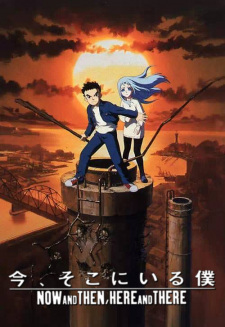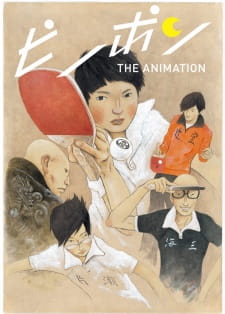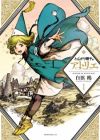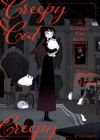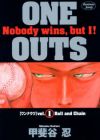Exploration into the Psychological and Avant-Garde in Anime
Anime
Every animated media that has been made has the idea to tell a story and to express a feeling on the watcher. But then, there are some series which has a particular way to evocate their sentiments and they use different tools to do that. Thought provoking writing, displaying the characters' internal monologues, their struggles and fears, using particular cinematographic angles and by blending contrasting styles of animation, coloring and highly symbolical and metaphorical imagery - these are some of the many hallmarks signifying the said animation has psychological themes, and that it is avant-garde in it's approach. This method of expression is not limited to any genre, as well.
I do realize that animation like this may not be for everyone, but I firmly believe in it's artistic merits and integrity. Media like this allows us to peek into the human psyche and probably our own too, and it provides us with often interesting viewpoints of our world, even if fractured through the prism of the animated fiction. Shows like that also likes to ask us questions without answers, to give us moral dilemmas without solid conclusion or in summary, to provoke us to think.
The shows that were picked follow a pattern - the ones which are more straightforward, less abstract and easier to get into will be first and the more complex and obscure the works will be at the end.
I do realize that animation like this may not be for everyone, but I firmly believe in it's artistic merits and integrity. Media like this allows us to peek into the human psyche and probably our own too, and it provides us with often interesting viewpoints of our world, even if fractured through the prism of the animated fiction. Shows like that also likes to ask us questions without answers, to give us moral dilemmas without solid conclusion or in summary, to provoke us to think.
The shows that were picked follow a pattern - the ones which are more straightforward, less abstract and easier to get into will be first and the more complex and obscure the works will be at the end.
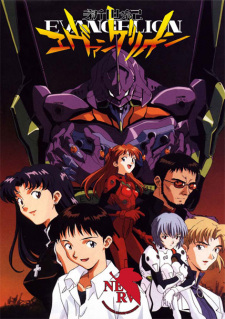
TV, 1995,
26 eps
Me:-
Author:10
Neon Genesis Evangelion is too obvious of a pick for this list, it's almost cliched, but there's a reason for this.
First of all, this show perfectly explores and focuses solely on it's psychological themes, probably far too much for some watchers. As well as that, the show doesn't stray from the abstraction in imagery and tone and is oftenly labelled as "pretentious" by some. Both sides may have a point, but the strength of Eva as a show lies in the translation of raw emotions in very unapologetic way, straight from it's script onto the viewer.
Second, we may not had the chance to talk about psychological themes in anime if Eva hadn't existed and I mean this in the historical sense of things. Aired in 1995, it caused complete uproar by not being adaptation of a manga, but also as work which is that upfront in its existential and nihilistic ideas, which was totally unheard of in the anime medium up to this point. It's roaring popularity proved that you can make anime that's original to the media and not a manga adaptation, and you can be extremely risque in the themes and concepts you're aiming to explore with it, as long as you're sincere about them. That eventually led to the boom of the experimental shows up until the 2010's and it's influence can be traced to the origin of many other shows.
That being said, I don't believe Eva is a good show for people who'd just began watching anime. In my opinion, experiencing mainstream anime in all it's forms would lead to better appreciate this one to the fullest. Extra bonus will be if you're acquainted with the way classical mecha shows work, since Eva in it's core is a mecha story, with twisted/deconstructed plot, in which it includes a lot more than it initially pretends to. This series is a work that tries to explore the ups and downs of the human psyche, by using the veil of a "mecha show" to lure people in, but after the initial premise, to explore and expand upon the human condition, and how frail and wavering it is in the face of the insurmountable dread that follows the cast.
Ironically in the years after, a vast majority of mecha series included in themselves themes that tackle the human psyche, as well as insight upon the internal traumas that cast had to suffer just to prolong it's often nihilistic existence with yet another day, which are integral to the narrative of Evangelion.
First of all, this show perfectly explores and focuses solely on it's psychological themes, probably far too much for some watchers. As well as that, the show doesn't stray from the abstraction in imagery and tone and is oftenly labelled as "pretentious" by some. Both sides may have a point, but the strength of Eva as a show lies in the translation of raw emotions in very unapologetic way, straight from it's script onto the viewer.
Second, we may not had the chance to talk about psychological themes in anime if Eva hadn't existed and I mean this in the historical sense of things. Aired in 1995, it caused complete uproar by not being adaptation of a manga, but also as work which is that upfront in its existential and nihilistic ideas, which was totally unheard of in the anime medium up to this point. It's roaring popularity proved that you can make anime that's original to the media and not a manga adaptation, and you can be extremely risque in the themes and concepts you're aiming to explore with it, as long as you're sincere about them. That eventually led to the boom of the experimental shows up until the 2010's and it's influence can be traced to the origin of many other shows.
That being said, I don't believe Eva is a good show for people who'd just began watching anime. In my opinion, experiencing mainstream anime in all it's forms would lead to better appreciate this one to the fullest. Extra bonus will be if you're acquainted with the way classical mecha shows work, since Eva in it's core is a mecha story, with twisted/deconstructed plot, in which it includes a lot more than it initially pretends to. This series is a work that tries to explore the ups and downs of the human psyche, by using the veil of a "mecha show" to lure people in, but after the initial premise, to explore and expand upon the human condition, and how frail and wavering it is in the face of the insurmountable dread that follows the cast.
Ironically in the years after, a vast majority of mecha series included in themselves themes that tackle the human psyche, as well as insight upon the internal traumas that cast had to suffer just to prolong it's often nihilistic existence with yet another day, which are integral to the narrative of Evangelion.
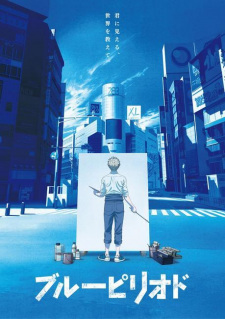
TV, 2021,
12 eps
Me:-
Author:8
One very common, yet complex question is - what is art and how do you explore, identify and explain it to the others? We all have our way to define it for ourselves, but then again everyone has different answer, so whose interpretation is the right one?
Blue Period is a show that cannot answer by itself these eternal questions, but it asks it's watchers to ponder upon them and in a way, creates a solid basis for discussion on the topics of art, self-discovery and expression of the self through one's work.
In this story we follow our main character, who had just realized the fact that he'd been living his whole life conforming to what others expect him to be, rather than perceiving what he wants to be, and the engine for this change was the impact of a certain art piece. The feelings that the painting had evoked in him fueled his dormant desire to express them on a canvas, which is a goal that any creator desires to achieve no matter the media that's they work with.
As the show progresses, it hardly focuses on the pure practicality, but rather, on the thought process, mental state and motivation of our protagonist, and his ever growing desire to express himself. This is no longer just a hobby of his - in this endeavor he sees an outlet for his emotions, which in turn helps him to grow as a person. By perceiving his metamorphosis, he also starts to see the small, and fine details within the others - their internal struggles, their flaws and their strong points as people, as well as artists.
This show is a perfect introduction on the topic of art, and insight on why it is something that significant for our species. We might not realize it fully, but it's importance lies in the fact that it's a tool with which we can express the reality or our imagination, through the prism of our own understandings and comprehension. We can also say that no matter the media one indulges in, there's always room for artistry, and finely crafted, even if bold displays of view points, which can be said to be one of the definitions of the Avant-Garde as a concept.
Blue Period is a show that cannot answer by itself these eternal questions, but it asks it's watchers to ponder upon them and in a way, creates a solid basis for discussion on the topics of art, self-discovery and expression of the self through one's work.
In this story we follow our main character, who had just realized the fact that he'd been living his whole life conforming to what others expect him to be, rather than perceiving what he wants to be, and the engine for this change was the impact of a certain art piece. The feelings that the painting had evoked in him fueled his dormant desire to express them on a canvas, which is a goal that any creator desires to achieve no matter the media that's they work with.
As the show progresses, it hardly focuses on the pure practicality, but rather, on the thought process, mental state and motivation of our protagonist, and his ever growing desire to express himself. This is no longer just a hobby of his - in this endeavor he sees an outlet for his emotions, which in turn helps him to grow as a person. By perceiving his metamorphosis, he also starts to see the small, and fine details within the others - their internal struggles, their flaws and their strong points as people, as well as artists.
This show is a perfect introduction on the topic of art, and insight on why it is something that significant for our species. We might not realize it fully, but it's importance lies in the fact that it's a tool with which we can express the reality or our imagination, through the prism of our own understandings and comprehension. We can also say that no matter the media one indulges in, there's always room for artistry, and finely crafted, even if bold displays of view points, which can be said to be one of the definitions of the Avant-Garde as a concept.

TV, 2006,
11 eps
Me:-
Author:10
Bartender as a series is not a show that dabbles that deep into the characters' psyche and condition, but rather it explores the ways that a person can reach inner peace, even if temporary. The catalyst for their changes is a kind and very perceptive bartender that puts his utmost care to be attentive to his clients for their drinks, as well as to offer them his understanding and perception through their existential dilemmas.
Through different interpretations of the presented alcohol and cocktails the gentle bartender weaves his stories, presenting to the guests another viewpoint on their problems and worries, which doesn't instantly clears them, but quite realistically, sets their mind in motion and lets them relax from their busy and hectic everyday struggles with a glass of drink, a drink with story, meaning and purpose.
The series feels almost therapeutic in the way it treats their audience, with respect and understanding and with a hint of complexity, but never being insincere to them. You can draw a lot of allegories from this media, but the most befitting for me is that this show is a niche one, just like the bar, featured into it, the wise and quiet bartender is the series itself, and the customer ? That's you, being tired from the stale and formulaic nature that the anime media tends to cling to. So to show you, the tired viewer, that there are other works that strive to explore with grace and elegance many unorthodox topics, you're being served this gem a show, which might appear strange and dull for some at a first glance, but once you take a sip and let it's taste simmer over your taste buds, you might appreciate the appeal and depth of it's flavor.
Through different interpretations of the presented alcohol and cocktails the gentle bartender weaves his stories, presenting to the guests another viewpoint on their problems and worries, which doesn't instantly clears them, but quite realistically, sets their mind in motion and lets them relax from their busy and hectic everyday struggles with a glass of drink, a drink with story, meaning and purpose.
The series feels almost therapeutic in the way it treats their audience, with respect and understanding and with a hint of complexity, but never being insincere to them. You can draw a lot of allegories from this media, but the most befitting for me is that this show is a niche one, just like the bar, featured into it, the wise and quiet bartender is the series itself, and the customer ? That's you, being tired from the stale and formulaic nature that the anime media tends to cling to. So to show you, the tired viewer, that there are other works that strive to explore with grace and elegance many unorthodox topics, you're being served this gem a show, which might appear strange and dull for some at a first glance, but once you take a sip and let it's taste simmer over your taste buds, you might appreciate the appeal and depth of it's flavor.
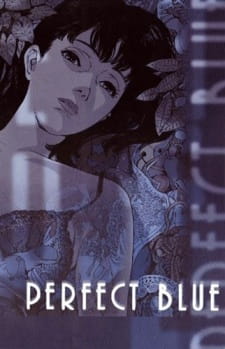
Movie, 1998,
1 ep
Me:-
Author:8
It's practically unfair to talk about the human psychology and to not include the works of Satoshi Kon, I personally added Perfect Blue for the reason that it's easier to consume and it's more packed with the flair of his cinematography and writing, but it's also fair to consider checking all of his movies as well as the only series he wrote, Paranoia Agent.
His pieces are easily distinguishable, for the vividness and the brashness of his color palettes and depicted imagery, as well as the sincere duality that he uses to portray his cast with. For his extravagant cinematography and constant plays with tones, shades and hues in his works, he personally chose the animated medium over the live-action, just so he can be creatively free to the brim with his artistic expressions, and this is easy to see.
If you enjoyed Perfect Blue I'm sure that Paranoia Agent and his other movies would feel just right at your alley - the presentation of his works is truly avant-garde and brash, but that flamboyance is always backed up with characters, whose emotions and feelings are morbid, quite confusing, and very, very relatable.
His pieces are easily distinguishable, for the vividness and the brashness of his color palettes and depicted imagery, as well as the sincere duality that he uses to portray his cast with. For his extravagant cinematography and constant plays with tones, shades and hues in his works, he personally chose the animated medium over the live-action, just so he can be creatively free to the brim with his artistic expressions, and this is easy to see.
If you enjoyed Perfect Blue I'm sure that Paranoia Agent and his other movies would feel just right at your alley - the presentation of his works is truly avant-garde and brash, but that flamboyance is always backed up with characters, whose emotions and feelings are morbid, quite confusing, and very, very relatable.
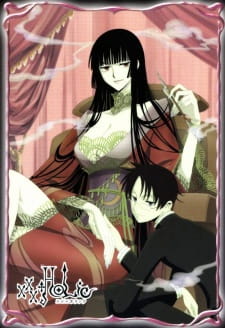
TV, 2006,
24 eps
Me:-
Author:7
This series likes to tackle it's themes in roundabout way - by presenting itself as happy-go-lucky mystery ride through the esoterical and the various mystical rituals from the Japanese folklore, but in the same way it's evocatively interpreting and reinforcing them with relevance towards the current times, by this way dealing with various dark and unsettling topics with relaxed grace.
Within our characters and their metamorphosis throughout the show, there's a steady curve of progression on a psychological level, based on the many decisions that they've made along the way and the consequences they had to endure. It's a story that deals with the desires, needs and wishes of the human psyche - it traces them to their humble, often naive inceptions, by this way allowing us to see how they can corrupt the person they inhabit if they're not properly comprehended and treated. On prima vista, the series deals with the supernatural phenomena and the cast attempts to explain their psychological and philosophical roots - there are no such things as curses, just weakness of the human mind, there are no virtues within a person, who hopelessly clings to their vices and fails to understands their actual needs.
While the show doesn't always delves into these aspects it can definitely be said that it was created in mind to present us it's peculiar, abstract concept of a setting that likes to test our preconceptions, but doesn't like to sound too serious or preachy in it's tone. The themes of fate, our inevitability to avoid it and the ways we struggle while hopelessly trying to change it are crucial part of the story. The human trauma is inevitable, but we should try our best to learn from it, and strengthen our resolve for the upcoming storms, rather to grow brittle from them.
Within our characters and their metamorphosis throughout the show, there's a steady curve of progression on a psychological level, based on the many decisions that they've made along the way and the consequences they had to endure. It's a story that deals with the desires, needs and wishes of the human psyche - it traces them to their humble, often naive inceptions, by this way allowing us to see how they can corrupt the person they inhabit if they're not properly comprehended and treated. On prima vista, the series deals with the supernatural phenomena and the cast attempts to explain their psychological and philosophical roots - there are no such things as curses, just weakness of the human mind, there are no virtues within a person, who hopelessly clings to their vices and fails to understands their actual needs.
While the show doesn't always delves into these aspects it can definitely be said that it was created in mind to present us it's peculiar, abstract concept of a setting that likes to test our preconceptions, but doesn't like to sound too serious or preachy in it's tone. The themes of fate, our inevitability to avoid it and the ways we struggle while hopelessly trying to change it are crucial part of the story. The human trauma is inevitable, but we should try our best to learn from it, and strengthen our resolve for the upcoming storms, rather to grow brittle from them.
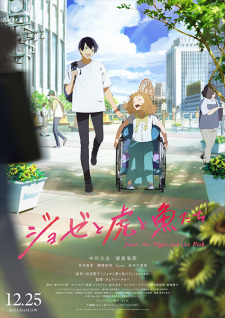
Movie, 2020,
1 ep
Me:-
Author:9
At it's basis this is one beautiful romantic movie. What did pleasantly surprised me is the way it manages to elevate itself from a simple love story, in a way that showed the character's growth and the steady way they emotionally matured over the short span over the story's length.
While the charm and chemistry of the couple alone is captivating and mellow, the fact that their distinct and interesting characters were intricately shown and explored was definitely a narrative treat. All of the characters felt humane, as in they all had a mixture of strengths and weaknesses within them. The movie never tries to obviously made you pity some of the cast, which is something that the more prosaic and melodramatic writing usually dabbles into when there is a crippled person in the cast.
In similar movies of this genre usually the problems of the couple are blatantly and ignorantly shoved somewhere else, and some cliched phrases are thrown in to make the viewer feel good, and to have a pleasant, and relaxed viewing. It's important to note that this movie proves it's point by showing how love can be this motivational push to change and refine yourself into a better person for your own good , and how by standing your ground, facing your own problems and struggling with them you can realize what matters to you and what makes your own life significant. Also, this movie is one honest discussion of one's dreams - why they matter and why you always need to balance and consider them in your current relationships. Everyone should have their own dreams and something to strive for, but then again they should never forget to live in the present, along with the people who wholeheartedly support our decisions and care about us.
While the charm and chemistry of the couple alone is captivating and mellow, the fact that their distinct and interesting characters were intricately shown and explored was definitely a narrative treat. All of the characters felt humane, as in they all had a mixture of strengths and weaknesses within them. The movie never tries to obviously made you pity some of the cast, which is something that the more prosaic and melodramatic writing usually dabbles into when there is a crippled person in the cast.
In similar movies of this genre usually the problems of the couple are blatantly and ignorantly shoved somewhere else, and some cliched phrases are thrown in to make the viewer feel good, and to have a pleasant, and relaxed viewing. It's important to note that this movie proves it's point by showing how love can be this motivational push to change and refine yourself into a better person for your own good , and how by standing your ground, facing your own problems and struggling with them you can realize what matters to you and what makes your own life significant. Also, this movie is one honest discussion of one's dreams - why they matter and why you always need to balance and consider them in your current relationships. Everyone should have their own dreams and something to strive for, but then again they should never forget to live in the present, along with the people who wholeheartedly support our decisions and care about us.
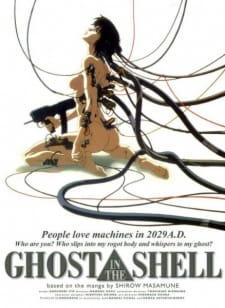
Movie, 1995,
1 ep
Me:-
Author:8
A classic of a movie that talks volumes about the rapid technological advances of our kind, but the decline of our spiritual selves. A work that inspired worldwide cult following as well as various animated or live-action productions, this movie is an absolute staple for the cyberpunk culture as we now know it, and the themes that this genre of fiction usually revels in.
We can say that the whole Ghost in the Shell franchise is a decent recommendation if you're interested about the philosophical and psychological state of the humankind and it's struggle to accept it's place in the existing world. Even though the whole franchise tackles many themes of this aspect, this movie by itself is condensed and standalone enough to be taken on as it is, without further sequels.
If you are interested in the multilayered, drawn our and quiet contemplations on the topic of what makes us human, what humanity stands for, or what would it mean to be human in the far future, in a reality in which everyone has physical agumentations and the AI's intelligence and cognition had reached heights that are unheard of. It might be that our minds and souls are what makes us special, but what if this can be manufactured as well? If you enjoy topics like this and you still haven't checked it, I don't see a reason why shouldn't give it a go.
We can say that the whole Ghost in the Shell franchise is a decent recommendation if you're interested about the philosophical and psychological state of the humankind and it's struggle to accept it's place in the existing world. Even though the whole franchise tackles many themes of this aspect, this movie by itself is condensed and standalone enough to be taken on as it is, without further sequels.
If you are interested in the multilayered, drawn our and quiet contemplations on the topic of what makes us human, what humanity stands for, or what would it mean to be human in the far future, in a reality in which everyone has physical agumentations and the AI's intelligence and cognition had reached heights that are unheard of. It might be that our minds and souls are what makes us special, but what if this can be manufactured as well? If you enjoy topics like this and you still haven't checked it, I don't see a reason why shouldn't give it a go.

Movie, 2010,
1 ep
Me:-
Author:9
This compilation of 6 short movies manages to portray in it's length a plethora of human emotions and feelings, scattered across the nameless sand wastelands in which numerous soldiers held out their last orders, all in the name of a futile conflict.
In a fashion similar to the Gundam franchise neither of the warring factions are good or bad, their actions are politically and economically fair, which on the get go shows us that the depicted setting represents moral grayness. Our main character serves as our emotional mirror throughout the series, with it's hesitance to even participate in this war and the never ending struggles that constantly chips away at his humanity, leading to his metamorphosis. On the battlefield, every single decision could mean taking or saving a life and the weight of being responsible for so much human fates is a fact that slowly corrodes and dissolves his naivete and former idealism.
The whole big picture of this show displays us how hollow and meaningless words like "honor","dignity" and "glory" are, when compared to the grim reality that most of the Golem pilots rarely dies with their bodies intact, and not crushed beneath the quartz frames of their mechanical prisons.This show is showing you the war's ugliness and futility, and quietly asks you, "What do you think of this situation?". Another interesting point that was displayed was the way that war propaganda can shape up whole generations to be hostile and biased towards each other, even though they have similar backgrounds.
Break Blade is one refreshing departure from the new mecha shows, and instead unveils it's war drama more akin to the old real mecha series of the past. The great detail in which the melee battles are shown, and the mechanical details on the Golems, presented as actual machines, whose blades crack, armors get punctured and pilots being smashed under the weight of these monolithic behemoths can really present us the tension and horror of the medieval battlefields, even if the setting is sci-fi.
The beautiful score, sung and provided by KOKIA is both evocative, yet full with grief, both melancholic and drenched in regrets and rejection of this cruel reality that this world presents to us.
This miniseries presents one very grounded approach on the concept of war using mechas, with things of consideration such as provisions, ammunition, reconnaissance and even engaging and disengaging strategies and maneuvers, but in the same way it has a solid emotional core, which shows the unquestionable brutality and defilement that the war brings on us all, in both physical and psychological toll.
In a fashion similar to the Gundam franchise neither of the warring factions are good or bad, their actions are politically and economically fair, which on the get go shows us that the depicted setting represents moral grayness. Our main character serves as our emotional mirror throughout the series, with it's hesitance to even participate in this war and the never ending struggles that constantly chips away at his humanity, leading to his metamorphosis. On the battlefield, every single decision could mean taking or saving a life and the weight of being responsible for so much human fates is a fact that slowly corrodes and dissolves his naivete and former idealism.
The whole big picture of this show displays us how hollow and meaningless words like "honor","dignity" and "glory" are, when compared to the grim reality that most of the Golem pilots rarely dies with their bodies intact, and not crushed beneath the quartz frames of their mechanical prisons.This show is showing you the war's ugliness and futility, and quietly asks you, "What do you think of this situation?". Another interesting point that was displayed was the way that war propaganda can shape up whole generations to be hostile and biased towards each other, even though they have similar backgrounds.
Break Blade is one refreshing departure from the new mecha shows, and instead unveils it's war drama more akin to the old real mecha series of the past. The great detail in which the melee battles are shown, and the mechanical details on the Golems, presented as actual machines, whose blades crack, armors get punctured and pilots being smashed under the weight of these monolithic behemoths can really present us the tension and horror of the medieval battlefields, even if the setting is sci-fi.
The beautiful score, sung and provided by KOKIA is both evocative, yet full with grief, both melancholic and drenched in regrets and rejection of this cruel reality that this world presents to us.
This miniseries presents one very grounded approach on the concept of war using mechas, with things of consideration such as provisions, ammunition, reconnaissance and even engaging and disengaging strategies and maneuvers, but in the same way it has a solid emotional core, which shows the unquestionable brutality and defilement that the war brings on us all, in both physical and psychological toll.
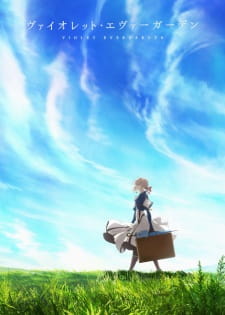
TV, 2018,
13 eps
Me:-
Author:10
The power of words, as a concept, is something that is very tangible and yet, way too simplistic, on prima vista. We all use them in our everyday lives, constantly and usually without a single thought on how significant they can be at certain moments, for understanding and conveying our emotions to the others. They can be the bridge that binds us to one another, making us feel empathetic, affectionate and understanding towards the others.
The themes of this show is the path that our main heroine takes, living all her life as a tool of destruction, which suddenly gains sentience and tries to understand her own feelings, those of the others beside her and those that she had from the past. The exploration of oneself, as well as the understanding of the human nature, which is both fickle yet resilient, capable of harming or helping others, are the main themes on which this work paints for us, with it's vivid, glittering colours, full of life and brimming with energy.
The soothing musical scores and the evocative imagery brings life to this beautiful show, full of emotions, which can both hurt us and alleviate us of our personal pain. Seeing how every person could be this moved from the right words, at the right time, if they are delivered with the proper understanding of their circumstances, and being full of empathy, is something that is worth being contemplated by anyone and is a lesson on being humane in it's most synthesized kind.
The themes of this show is the path that our main heroine takes, living all her life as a tool of destruction, which suddenly gains sentience and tries to understand her own feelings, those of the others beside her and those that she had from the past. The exploration of oneself, as well as the understanding of the human nature, which is both fickle yet resilient, capable of harming or helping others, are the main themes on which this work paints for us, with it's vivid, glittering colours, full of life and brimming with energy.
The soothing musical scores and the evocative imagery brings life to this beautiful show, full of emotions, which can both hurt us and alleviate us of our personal pain. Seeing how every person could be this moved from the right words, at the right time, if they are delivered with the proper understanding of their circumstances, and being full of empathy, is something that is worth being contemplated by anyone and is a lesson on being humane in it's most synthesized kind.
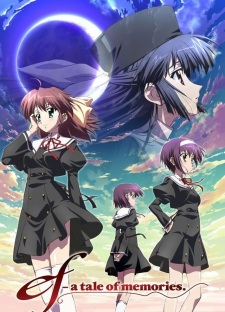
TV, 2007,
12 eps
Me:-
Author:10
These series manages to be both lyrical, delicate, emotionally moving, thought provoking, and in the same time, built upon layers upon layers of metaphors and artistic expressionism.
This show and it's sequel, ef:A Tale of Melodies, manages to be this beautiful, slowly developing romance, build upon the characters' feeling of affection and longing , while in the same time it manages to present us their well-defined, psychological stances and their shortcomings, weaknesses and complexes. It is a story about personal doubts, anxieties, and griefs, which by the understanding and support from their significant others, slowly refines and purifies them into hope, and willingness to face the problems of tomorrow with renewed strength, together.
The abstractness of the visual presentations and the artistic cinematography enhances the emotional sway that the series has, elevating and giving them it's specific design and aesthetics. The shot compositions and the usage of various visual techniques to portray the character's internal struggles and current feelings are very unique and one of a kind, which makes this series quite the experimental and artistic experience.
This show manages to show us how we should try to accept ourselves and those who support us in our hardest moments, despite our hesitations about it. Being alone is the place we all start from, but it doesn't have to end this way, by loving or being loved, we do learn to care for the others, and this fact defines our personal growth as human beings. I do believe the struggles that the characters has can be relatable to anyone, and by looking at them you can certainly see parts of your own personality and character. For me personally, this might be one of the most emotionally dense romances, it can stir your heart in many ways, by making you feel the joy of loving and by being loved by someone, as well as the the feelings of painfully yearning for their affection and understanding.
This show and it's sequel, ef:A Tale of Melodies, manages to be this beautiful, slowly developing romance, build upon the characters' feeling of affection and longing , while in the same time it manages to present us their well-defined, psychological stances and their shortcomings, weaknesses and complexes. It is a story about personal doubts, anxieties, and griefs, which by the understanding and support from their significant others, slowly refines and purifies them into hope, and willingness to face the problems of tomorrow with renewed strength, together.
The abstractness of the visual presentations and the artistic cinematography enhances the emotional sway that the series has, elevating and giving them it's specific design and aesthetics. The shot compositions and the usage of various visual techniques to portray the character's internal struggles and current feelings are very unique and one of a kind, which makes this series quite the experimental and artistic experience.
This show manages to show us how we should try to accept ourselves and those who support us in our hardest moments, despite our hesitations about it. Being alone is the place we all start from, but it doesn't have to end this way, by loving or being loved, we do learn to care for the others, and this fact defines our personal growth as human beings. I do believe the struggles that the characters has can be relatable to anyone, and by looking at them you can certainly see parts of your own personality and character. For me personally, this might be one of the most emotionally dense romances, it can stir your heart in many ways, by making you feel the joy of loving and by being loved by someone, as well as the the feelings of painfully yearning for their affection and understanding.

TV, 1999,
26 eps
Me:-
Author:8
This show does very good comparison between the portrayal of human mind of the nowadays, as opposed to ways that the post-apocalyptic, survival-focused person would act and consider as rational and fair.
The state of the survived human society in this work makes logical sense in the way it operates, since it represents accurately what a survivor would consider important, securing their base necessities, working in absolutes when a risk/gain situation is decided upon, and living as efficiently as possible with the remaining resources, which is totally fine on paper, but in the process of adaptation, the virtues one considers nowadays as a given are extinct, and the remaining humans had more or less lost their humanity, in a general sense. In a way our character is shown to be initially the only person with normal human sensibilities in a world, devoid of them, and is in a way, alone in his solitude, even tho he lives within other of his kind.
Another interesting topic from psychological standpoint is the character development and evolution that he has, trying to fit in the current norms but then again failing, for the simple reason that he is way out of touch with this primitive and militaristic existence. Interesting clash of understandings and customs is the way the current society express their sexual desires and urges, which are straight up baffling for our main protagonist, and the utter lack of concepts as love and companionship in their relationships.
The show has definitely some interesting concepts in it's writing, and it more or less manages to be very consistent in it's themes. The series also feels pretty gritty and grounded, so this can be interesting watch even for the hard-sci-fi enthusiasts.
The state of the survived human society in this work makes logical sense in the way it operates, since it represents accurately what a survivor would consider important, securing their base necessities, working in absolutes when a risk/gain situation is decided upon, and living as efficiently as possible with the remaining resources, which is totally fine on paper, but in the process of adaptation, the virtues one considers nowadays as a given are extinct, and the remaining humans had more or less lost their humanity, in a general sense. In a way our character is shown to be initially the only person with normal human sensibilities in a world, devoid of them, and is in a way, alone in his solitude, even tho he lives within other of his kind.
Another interesting topic from psychological standpoint is the character development and evolution that he has, trying to fit in the current norms but then again failing, for the simple reason that he is way out of touch with this primitive and militaristic existence. Interesting clash of understandings and customs is the way the current society express their sexual desires and urges, which are straight up baffling for our main protagonist, and the utter lack of concepts as love and companionship in their relationships.
The show has definitely some interesting concepts in it's writing, and it more or less manages to be very consistent in it's themes. The series also feels pretty gritty and grounded, so this can be interesting watch even for the hard-sci-fi enthusiasts.
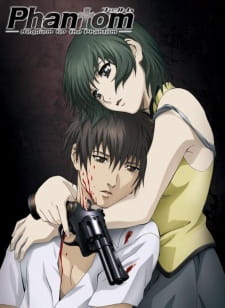
TV, 2009,
26 eps
Me:-
Author:9
Phantom is a slow burner of a show, presenting us the ways in which them human mind can evolve when pushed to the extremes, against the borders of the natural human morality, and beyond it. The psychological aspect of this show is presented in the mental tortures that our main protagonist has to endure as he tries to suddenly adapt to the unapologetic rules of "kill or be killed", and the way he grows up to be, refusing to abandon his attachments towards the few people in his life that he cherishes.
The symbol of the masks in this show present us the idea that the characters are hiding and disregarding their emotions, an act that slowly corrodes them and makes them desensitized to human pain, be it theirs or the others. They slowly, but steadily are subjugated to destroy the humanity they had within them, held back only by their bond with one another - born out of desperation, but also by their own empathy towards one another.
The struggle of finding yourself beneath the layers of depravity and the fact that by taking the lives of others, one starts to lose their sense of humanity and eventually ceases to be human on a moral standpoint are few of the main topics of contemplation, presenting us in detail the character's gradual degradation and metamorphosis. This is not something you can turn back to, it constantly haunts you in your lifetime and hampers any hope that you might someday live a normal life as a human being.
This show is an interesting blend of psychological thriller and emotional piece of media, one that shows how much can the environment in which you live can influence and erode your past self. In the same sense though the character's desires to end the cycle of violence that they're bound to live in are shown as well. Their personalities are well defined and morally grey, presenting us people who had embraced the life of cruelty they have to live in, but in the same time we can see their desires and hopes that they share on their futile paths of redemption.
The symbol of the masks in this show present us the idea that the characters are hiding and disregarding their emotions, an act that slowly corrodes them and makes them desensitized to human pain, be it theirs or the others. They slowly, but steadily are subjugated to destroy the humanity they had within them, held back only by their bond with one another - born out of desperation, but also by their own empathy towards one another.
The struggle of finding yourself beneath the layers of depravity and the fact that by taking the lives of others, one starts to lose their sense of humanity and eventually ceases to be human on a moral standpoint are few of the main topics of contemplation, presenting us in detail the character's gradual degradation and metamorphosis. This is not something you can turn back to, it constantly haunts you in your lifetime and hampers any hope that you might someday live a normal life as a human being.
This show is an interesting blend of psychological thriller and emotional piece of media, one that shows how much can the environment in which you live can influence and erode your past self. In the same sense though the character's desires to end the cycle of violence that they're bound to live in are shown as well. Their personalities are well defined and morally grey, presenting us people who had embraced the life of cruelty they have to live in, but in the same time we can see their desires and hopes that they share on their futile paths of redemption.
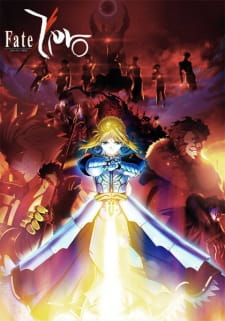
TV, 2011,
13 eps
Me:-
Author:9
The Fate franchise in general is one marked by conflicting viewpoints, ideals and goals between both the mages and their servants, which by itself creates this entertaining to observe web of relationships, companionship and rivalries between them.
Fate/Zero is a show in a specific position within the cannon of the series, but by it's merits alone, even without the other additions of the other shows, it is a series with superb character writing and fast paced plot, providing solid and consistent watching experience as a standalone project. But even within the exciting action scenes with impressive cinematography, the attention to the character's personalities and their interactions with one another is never compromised, and handled with care.
Their pride, their vanity, their virtues, it's all laid bare to us. Some of them fight for the sole reason of creating bloodshed, others are struggling for those who hold dear, there are those who uphold their pride and honor, and there are others who are dedicated to do unspeakable atrocities, all in order to bring the ultimate peace, no matter the cost and sacrifices.
The complex relationship between all of the contestants is like an intricate game of chess, where many players are playing on the same chess board, but they control only one figure - there's the rushes, deceptions, the honorable and straightforward players, and the fickle and mercurial bluffers, the grand strategists and the silent martyrs. Everyone of them knows the final prize and tries their best to attain it by using their own unique style and ways.
On top of their interpersonal and well written intrigue, there are the silent, and well developed moments of respite, in which both mages and servants talks about and share their dreams, ideals and goals with one another, explaining their reasons and motives to join the fight in the first place. We are shown but a glimpses of their own past, from their most selfless sacrifices to their abominable betrayals, which makes this whole series a worthwhile watch for both it's interesting action, as well witnessing the character's gripping moments of celebration, grief and catharsis.
Fate/Zero is a show in a specific position within the cannon of the series, but by it's merits alone, even without the other additions of the other shows, it is a series with superb character writing and fast paced plot, providing solid and consistent watching experience as a standalone project. But even within the exciting action scenes with impressive cinematography, the attention to the character's personalities and their interactions with one another is never compromised, and handled with care.
Their pride, their vanity, their virtues, it's all laid bare to us. Some of them fight for the sole reason of creating bloodshed, others are struggling for those who hold dear, there are those who uphold their pride and honor, and there are others who are dedicated to do unspeakable atrocities, all in order to bring the ultimate peace, no matter the cost and sacrifices.
The complex relationship between all of the contestants is like an intricate game of chess, where many players are playing on the same chess board, but they control only one figure - there's the rushes, deceptions, the honorable and straightforward players, and the fickle and mercurial bluffers, the grand strategists and the silent martyrs. Everyone of them knows the final prize and tries their best to attain it by using their own unique style and ways.
On top of their interpersonal and well written intrigue, there are the silent, and well developed moments of respite, in which both mages and servants talks about and share their dreams, ideals and goals with one another, explaining their reasons and motives to join the fight in the first place. We are shown but a glimpses of their own past, from their most selfless sacrifices to their abominable betrayals, which makes this whole series a worthwhile watch for both it's interesting action, as well witnessing the character's gripping moments of celebration, grief and catharsis.
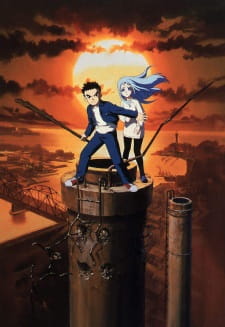
TV, 1999,
13 eps
Me:-
Author:8
The way this show works is interesting - in a way it feels like a deconstruction on the concept of traveling to another fantastical dimension. Usually in shows of this genre, simply called isekai, the main character finds themselves in a place of wonder, excitement and adventures, and they become the hero of this realm.
Well this work presents us one similar to that scenario, but with a twist - the world our protagonist are trapped in is bleak, dystopian future, a world with natural resource shortages and constant wars for the remaining left, waged by abused children who are forced to labor and are conscripted as soldiers in this twisted totalitarian regime. In a way, the more the story goes on, the more deranged the setting becomes, and more desperate the main cast is, trying to escape this place of harrowing dread, and existential torment.
This show is a grim reminder that despite this, being a work of fiction, exploitation and abuse like this is the reality in some parts of our world. It also works as a depiction of how crude and despicable wars are and their meaninglessness for the ordinary people who wage them on the behalf of their leader's whims.
In this work, the portrayal of the psychological state of the characters is handled with complexity and stoicism in mind. It's filled with sorrow, hopelessness and insanity, plagued by senseless abuse, torture and murders, but beyond that, the story does not perversely delve on it's darkness, but rather attempts to present them as trials that our young cast has to experience and persevere from, in order to attain their freedom and happiness.
Well this work presents us one similar to that scenario, but with a twist - the world our protagonist are trapped in is bleak, dystopian future, a world with natural resource shortages and constant wars for the remaining left, waged by abused children who are forced to labor and are conscripted as soldiers in this twisted totalitarian regime. In a way, the more the story goes on, the more deranged the setting becomes, and more desperate the main cast is, trying to escape this place of harrowing dread, and existential torment.
This show is a grim reminder that despite this, being a work of fiction, exploitation and abuse like this is the reality in some parts of our world. It also works as a depiction of how crude and despicable wars are and their meaninglessness for the ordinary people who wage them on the behalf of their leader's whims.
In this work, the portrayal of the psychological state of the characters is handled with complexity and stoicism in mind. It's filled with sorrow, hopelessness and insanity, plagued by senseless abuse, torture and murders, but beyond that, the story does not perversely delve on it's darkness, but rather attempts to present them as trials that our young cast has to experience and persevere from, in order to attain their freedom and happiness.
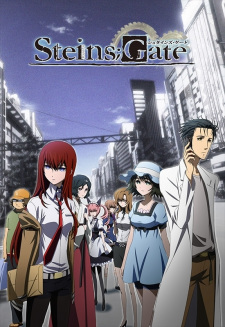
TV, 2011,
24 eps
Me:-
Author:8
Usually works with time traveling concepts in them could feel a bit difficult to be engaging, the fact being, that time traveling to a previous point could render certain character developments and interaction meaningless, making the watcher detached from what is really happening. This show, however, treats it's time travel with grit and understanding, focusing much more on the mental state of the main cast and how they comprehend this power.
Instead of trying to be the perfect time-traveling story, Stein's Gate goes for a more emotional tangent - how would the extensive time-travel make you feel, how the fact that you are completely alone in a situation where the only one who remembers every futile attempt to change the future is you alone. Time passes in it's own rules and even though a day might've passed in our lives, the time traveler could've passed by countless simulations in it. This harrowing concept, combined with the toned down, almost monochromatic style of coloring presents us in an artistically engaging way the bleakness and solitude in which the main protagonist exists and proceed to struggle, despite the grim and hopeless odds for his world's survival.
Another very interesting tie in with our real world is that the time-travel's story that this anime is based of, was borrowed from an internet forum, in which a person called John Titor did claimed to have leapt through time, with far too detailed explanation, that can certainly get your curiosity piqued.
Instead of trying to be the perfect time-traveling story, Stein's Gate goes for a more emotional tangent - how would the extensive time-travel make you feel, how the fact that you are completely alone in a situation where the only one who remembers every futile attempt to change the future is you alone. Time passes in it's own rules and even though a day might've passed in our lives, the time traveler could've passed by countless simulations in it. This harrowing concept, combined with the toned down, almost monochromatic style of coloring presents us in an artistically engaging way the bleakness and solitude in which the main protagonist exists and proceed to struggle, despite the grim and hopeless odds for his world's survival.
Another very interesting tie in with our real world is that the time-travel's story that this anime is based of, was borrowed from an internet forum, in which a person called John Titor did claimed to have leapt through time, with far too detailed explanation, that can certainly get your curiosity piqued.
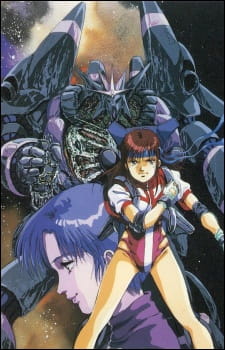
OVA, 1988,
6 eps
Me:-
Author:8
This show has both interesting production, as well as execution . It is referential to Neon Genesis Evangelion, since it was the directorial debut of Hideaki Anno, and Eva marks his artistic peak as a creator, and his lowest low as a human being, having serious problems, mental instabilities and severe depression. But amidst the pain and anguish, this time there is hope.
This work reflects a brighter moment in his life, but we can very well see the foundations upon which Eva was built upon. The setting and the traumas that the protagonists had experienced, their situations and their mentality can remind us of Eva's protagonist, but at their core, they are different in the way they handle their problems.
Also, it's important to be noted that despite the show's story, being straightforward experience, it can feel pretty experimental and art-house at the same time. The usage of uplifting and high intensity groovy insert songs is iconic, even if it may feel peculiar at the beginning. Also the usage of silence and the monochrome style in the last episode displays to us the director's willingness to take risque and avant-garde approaches in his storytelling, something that Eva is having in spades, all in order to express the specific vision of the director.
Despite their similarities the both shows are fundamentally different, though it goes to show how significant the mental state of the creators are, and how much that reflects in their works.
This work reflects a brighter moment in his life, but we can very well see the foundations upon which Eva was built upon. The setting and the traumas that the protagonists had experienced, their situations and their mentality can remind us of Eva's protagonist, but at their core, they are different in the way they handle their problems.
Also, it's important to be noted that despite the show's story, being straightforward experience, it can feel pretty experimental and art-house at the same time. The usage of uplifting and high intensity groovy insert songs is iconic, even if it may feel peculiar at the beginning. Also the usage of silence and the monochrome style in the last episode displays to us the director's willingness to take risque and avant-garde approaches in his storytelling, something that Eva is having in spades, all in order to express the specific vision of the director.
Despite their similarities the both shows are fundamentally different, though it goes to show how significant the mental state of the creators are, and how much that reflects in their works.
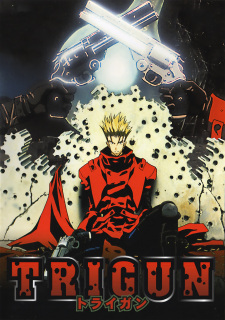
TV, 1998,
26 eps
Me:-
Author:10
This show just as it's cast, has many faces. They are all sincere, even though they are concealing their motives and emotions, to the point in which you are not sure which is the façade and which is their honest expression.
Considering this, the show presents us with high-octane, almost comedic and carefree approach in it's world building, which gradually and thematically shifts into something much different, personal and philosophical. The hyper stylized action shenanigans of the beginning are slowly, but certainly experiencing metamorphosis, and the dilemmas that the cast faces are more somber, and existential. It's a show which deceptively lulls you into it's straightforward premise, just so it could question your morality and present to you many complexities and parable without simple answers.
In this series the themes of pacifism and the courage to live your life, carrying your own cross and accepting the consequences of your actions are it's moving force. With it's interesting world building, we are shown one ruthless, lawless world, in which life is harsh and full of misery and shortages, which often provokes violent conflicts. One can say that the world is cruel, so they should become as equally as cruel to survive in it, but that's not the path Vash the Stampede had taken.
This show manages to translate the cast's trauma and the character's philosophy in motion, presenting us their grief, turmoil and hesitations on the dusty canvas of this rustic and crumbling world around them. I do believe this might be one of the best series about the topic of pacifism, why it does matter and the consequences one has to bear while keeping their resolve to hold on to this ideal. It's main character might be one of the most multi-faceted characters in existence - being this flamboyant gunman, charismatic misfit, and a melancholic martyr who tries to conceal his past traumas and grief behind his faint, sad smile.
Considering this, the show presents us with high-octane, almost comedic and carefree approach in it's world building, which gradually and thematically shifts into something much different, personal and philosophical. The hyper stylized action shenanigans of the beginning are slowly, but certainly experiencing metamorphosis, and the dilemmas that the cast faces are more somber, and existential. It's a show which deceptively lulls you into it's straightforward premise, just so it could question your morality and present to you many complexities and parable without simple answers.
In this series the themes of pacifism and the courage to live your life, carrying your own cross and accepting the consequences of your actions are it's moving force. With it's interesting world building, we are shown one ruthless, lawless world, in which life is harsh and full of misery and shortages, which often provokes violent conflicts. One can say that the world is cruel, so they should become as equally as cruel to survive in it, but that's not the path Vash the Stampede had taken.
This show manages to translate the cast's trauma and the character's philosophy in motion, presenting us their grief, turmoil and hesitations on the dusty canvas of this rustic and crumbling world around them. I do believe this might be one of the best series about the topic of pacifism, why it does matter and the consequences one has to bear while keeping their resolve to hold on to this ideal. It's main character might be one of the most multi-faceted characters in existence - being this flamboyant gunman, charismatic misfit, and a melancholic martyr who tries to conceal his past traumas and grief behind his faint, sad smile.

TV, 2002,
26 eps
Me:-
Author:8
Chobits is a show that's commonly being mistaken for just a sweet romantic comedy, but the themes it dives in to explore are much grounded and serious.
It likes to present us with classical concepts, but with a twist - what does it means to fall in love and the different kinds of love one can express, and in the same time, if we add in androids in the mix, is it possible for them to understand our feelings and affections ? What if the androids are in fact completely sentient, with their own personality and quirks, does that makes them suitable to be considered as partner in a relationship ?
There are humans that certainly respect and treats the androids as equals, but then again there are others who does use them as mere tools or to satisfy their needs and lusts. In essence, the whole show presents the humanity's flaws within a story that's brightly colored, and who has deceptively vivid and bright exterior. In fact, within the depicted society, considering your android as something more than a mere PC is something that is being shunned over, but then again, a lot of examples were presented along the show's runtime, proving the opposite, in which an android were considered as a family members, and the attachment the people had towards them far surpassed the physical contact.
Sometimes lighthearted. but sometimes serious, these series might not seem much on the surface, but it manages to be one interesting take on presumable problems that we might have in our future, but in the same way it does so in a very relaxed, grounded manner. There's so much genuine emotion in this show, both of sadness and joy, which makes it as one very endearing, and unique watch.
It likes to present us with classical concepts, but with a twist - what does it means to fall in love and the different kinds of love one can express, and in the same time, if we add in androids in the mix, is it possible for them to understand our feelings and affections ? What if the androids are in fact completely sentient, with their own personality and quirks, does that makes them suitable to be considered as partner in a relationship ?
There are humans that certainly respect and treats the androids as equals, but then again there are others who does use them as mere tools or to satisfy their needs and lusts. In essence, the whole show presents the humanity's flaws within a story that's brightly colored, and who has deceptively vivid and bright exterior. In fact, within the depicted society, considering your android as something more than a mere PC is something that is being shunned over, but then again, a lot of examples were presented along the show's runtime, proving the opposite, in which an android were considered as a family members, and the attachment the people had towards them far surpassed the physical contact.
Sometimes lighthearted. but sometimes serious, these series might not seem much on the surface, but it manages to be one interesting take on presumable problems that we might have in our future, but in the same way it does so in a very relaxed, grounded manner. There's so much genuine emotion in this show, both of sadness and joy, which makes it as one very endearing, and unique watch.

TV, 2001,
26 eps
Me:-
Author:9
Noir, just as the name of the series implies, is a somber tale, told in morally grey hues, which heavily leans on the character's psychological state and the thoughts which they're plagued by while dealing with their line of work. On top of the subtle nuances which the noir setting provides to the show, there is also the tension of mystery and concealed secret which lurks between the main duo.
They both want to uncover the truth of their past, but in the same way they stray away from the emotional trauma that it brings upon them, making their relationship both comforting and dynamic, on the verge of being friendship, but then again, one devoid of honesty and filled with fears of self-exposure to the other.
While the art is mostly in the grounded, subdued specter of coloring, there is a lot of artistic freedom when it comes to the visual representations, the cinematography and the subtle symbolism. The long, drawn out scenes with meticulously crafted OST, conveying the mood perfectly and letting you experience the cast's struggles and longings, the fast, interestingly choreographed gunslinging scenes, or just the moments when the series lets you breathe in into the atmosphere - they all help to give the viewers this specific feeling of drama, pathos and melancholy that surrounds our main duet of assassins.
They both want to uncover the truth of their past, but in the same way they stray away from the emotional trauma that it brings upon them, making their relationship both comforting and dynamic, on the verge of being friendship, but then again, one devoid of honesty and filled with fears of self-exposure to the other.
While the art is mostly in the grounded, subdued specter of coloring, there is a lot of artistic freedom when it comes to the visual representations, the cinematography and the subtle symbolism. The long, drawn out scenes with meticulously crafted OST, conveying the mood perfectly and letting you experience the cast's struggles and longings, the fast, interestingly choreographed gunslinging scenes, or just the moments when the series lets you breathe in into the atmosphere - they all help to give the viewers this specific feeling of drama, pathos and melancholy that surrounds our main duet of assassins.

TV, 2021,
20 eps
Me:-
Author:9
This show does a fresh take on the concept of immortality - how does an immortal cope with that and what they desire to do with their existence. In a way, that does sounds like the ultimate blessing one can attain in their life, but it might as well be the ultimate curse. Every natural existence has a beginning and end, so being unable to attain one of them makes you out of the norm, unable to blend in and comprehend the others's worries and trifles.
The series's story is being told in this very particular ambiance, you can say that it has the pace of slower, more steady journey, in which our main protagonist befriends and understands the people he meets in his travels. Each meeting shows them a new side of humanity, with both it's good and bad sides
and we're following the small footsteps of our main character towards their understanding of what it means to be human - both as individual, being part of a community, as well as understanding their reasons to feel grief or joy.
This work also asks the question, for an immortal being, that has no defined lifespan and theoretically cannot die, what really matters and what means something special in their life ? Our main character finds their significance by being part of the lives of some of the people he meets on their journey, and with the steady bonds they made with them. In a way, their frail and vulnerable lives are nothing but a flicker of a candle in a windy night, but then again, their existence is something that gives them the reason to cherish the other's lives and the desire to protect the whole of humanity.
The series's story is being told in this very particular ambiance, you can say that it has the pace of slower, more steady journey, in which our main protagonist befriends and understands the people he meets in his travels. Each meeting shows them a new side of humanity, with both it's good and bad sides
and we're following the small footsteps of our main character towards their understanding of what it means to be human - both as individual, being part of a community, as well as understanding their reasons to feel grief or joy.
This work also asks the question, for an immortal being, that has no defined lifespan and theoretically cannot die, what really matters and what means something special in their life ? Our main character finds their significance by being part of the lives of some of the people he meets on their journey, and with the steady bonds they made with them. In a way, their frail and vulnerable lives are nothing but a flicker of a candle in a windy night, but then again, their existence is something that gives them the reason to cherish the other's lives and the desire to protect the whole of humanity.
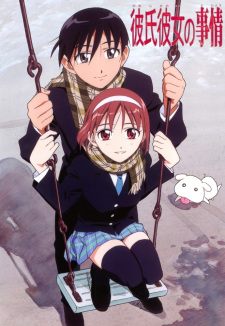
TV, 1998,
26 eps
Me:-
Author:7
Considering this anime is produced by Gainax, you just know there has to be a twist to this story, and that's right assesment. This show certainly has one of the most boring and reused settings, but it manages to tastefully flip it over and to present us probably one of the most interesting couples in romance anime in general, in the way how their interaction works and how their character development progresses.
Both of them seems perfect, from their peers' perspective, but they both use this facade to conceal their complexes, insecurities and actual personalities, but then again, through their conflicts they do manage to slowly uncover their true selves, and fall in love with each other. The way this is portrayed is defnately an interesting watch from psychological standpoint, since their complexes, weakneses and insecurities feels very tangible and relatable in a way, so these series may feel as a self-reflective watch for some people.
Both of them seems perfect, from their peers' perspective, but they both use this facade to conceal their complexes, insecurities and actual personalities, but then again, through their conflicts they do manage to slowly uncover their true selves, and fall in love with each other. The way this is portrayed is defnately an interesting watch from psychological standpoint, since their complexes, weakneses and insecurities feels very tangible and relatable in a way, so these series may feel as a self-reflective watch for some people.
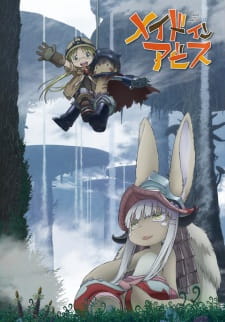
TV, 2017,
13 eps
Me:-
Author:9
This show's main theme is adventure, but along side it, the dangers of this. It does present us a fantasy setting, full of wonders and ancient contraptions from the bygone eras, but it doesn't just overstay it's welcome on the whimsical bits, but rather explores the fact that there are alot of adventurers that lose their lives and sanity, trying to chase these artifacts and relics, and that there are whole orphanages dedicated to children of these adventurers. Also the competition between adventurers of this sorts often leads to hostility and straight up murders, which just goes to show the gravity of the situation, as well as that the show doesn't shy away from fleshing out it's captivating, but cruel world.
The main cast's wanderlust and the reasons behind that are explored in details, and the setting's dark undertones are evident - the further the show goes, the less concealed they get. The descent for treasures and the consequences is allegorically explored in is universe's rule that the further you descent, the more you end up in pain and loss of your humanity, so at the end of the day, are the treasures that you're so eager to fetch worth the prize ?
Beneath the rounded, sweet designs of the main cast, you can see a show with alot of psychological questions, and the more you explore the stories of the other veteran adventurers, the more you'd ask yourself, isn't the price of being a famous adventurer far too high ? Is posessing powers and artifact beyond any normal comprehension worth it, for the price of not being able to think, behave and feel as a human ?
The main cast's wanderlust and the reasons behind that are explored in details, and the setting's dark undertones are evident - the further the show goes, the less concealed they get. The descent for treasures and the consequences is allegorically explored in is universe's rule that the further you descent, the more you end up in pain and loss of your humanity, so at the end of the day, are the treasures that you're so eager to fetch worth the prize ?
Beneath the rounded, sweet designs of the main cast, you can see a show with alot of psychological questions, and the more you explore the stories of the other veteran adventurers, the more you'd ask yourself, isn't the price of being a famous adventurer far too high ? Is posessing powers and artifact beyond any normal comprehension worth it, for the price of not being able to think, behave and feel as a human ?

TV, 2003,
13 eps
Me:-
Author:10
Gunslinger girl is a show about hope, amids the depths of despair. As we say hope, it's not used in the general sense, but more so in believing that tomorrow might be a better day, even though it probably won't, but still this thought might be the one thing that keeps you going, despite the odds.
It is also a series that explores the eternal question, does the means justifies the ends, in a more personal way, since this show, despite it's low episode count, manages to portray, with it's morally grey hues, gritty palettes and melancholic audio entourage the emotional state of the cast in it's depth.
The opening theme, featuring The Delgados's somber but sensual song "The Light Before We Land" features the beforementioned concept, of innocent children, realistically and proficiently using guns without hesitation, for their sole existence is to be used for covert operations. Their angelic and somber faces are in absolute contrast with the weapons that they're holding, which gives this feeling of uneasiness, that something is wrong and that even though they're tasked with uphold the peace, that price is far too high to be payed and this responsibility shouldn't be upheld by their frail shoulders.
And there comes the main pathos of the series, the thought of their existence alone is wrong, but due to certain circumstances, that is the only way they can live at all. But really, does life like this can be meaningful on a personal level for them, or is this only a means to survive the harsh reality of this brutal world ? Over the course of the show most of the cast answers for themselves this question, but the philosophical conclusion remains for the viewer to be decided.
Despite it having slight sci-fi additions, the story does feels grounded and does pays homage to real historical moment in the newer Italian history, which reinforces the realism and the grounded portrayal of the characters and their emotional status. Nevertheless, I do believe it's a show with very compelling psychological aspects, and one that requires your attention and empathy towards the setting, to fully engage you in it. The whole series are seeped in melancholic apathy, and I do believe this gentle feeling is masterfully conveyed onto us, the viewers.
It is also a series that explores the eternal question, does the means justifies the ends, in a more personal way, since this show, despite it's low episode count, manages to portray, with it's morally grey hues, gritty palettes and melancholic audio entourage the emotional state of the cast in it's depth.
The opening theme, featuring The Delgados's somber but sensual song "The Light Before We Land" features the beforementioned concept, of innocent children, realistically and proficiently using guns without hesitation, for their sole existence is to be used for covert operations. Their angelic and somber faces are in absolute contrast with the weapons that they're holding, which gives this feeling of uneasiness, that something is wrong and that even though they're tasked with uphold the peace, that price is far too high to be payed and this responsibility shouldn't be upheld by their frail shoulders.
And there comes the main pathos of the series, the thought of their existence alone is wrong, but due to certain circumstances, that is the only way they can live at all. But really, does life like this can be meaningful on a personal level for them, or is this only a means to survive the harsh reality of this brutal world ? Over the course of the show most of the cast answers for themselves this question, but the philosophical conclusion remains for the viewer to be decided.
Despite it having slight sci-fi additions, the story does feels grounded and does pays homage to real historical moment in the newer Italian history, which reinforces the realism and the grounded portrayal of the characters and their emotional status. Nevertheless, I do believe it's a show with very compelling psychological aspects, and one that requires your attention and empathy towards the setting, to fully engage you in it. The whole series are seeped in melancholic apathy, and I do believe this gentle feeling is masterfully conveyed onto us, the viewers.
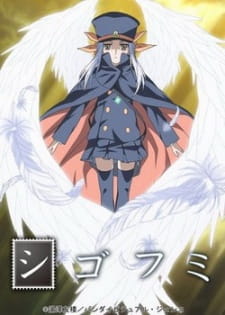
TV, 2008,
12 eps
Me:-
Author:8
This show presents us with a personal dilemma, If we were to die, and we have the chance to send only one person a letter from the afterlife, to whom it'd be adressed? Upon this simple, yet complex question is this short show based on, and for every single person, the answer is different.
The fragility of our mortality and the bounds on which we can operate and exist as a living beings is a topic, pondered upon the ages, and yet this show does the same, but with a twist - we're following the messenger of these letters, and not the people who've passed away. At the same time, the circumstances upon the messenger exists and is bound to are slowly, yet intricately explored, which offers yet another mystery upon us.
This show's appeal lies in the psychological narrative, upon which we stumble upon the fates of others, who are more oftenly mistreated and undeserved, and yet we can do nothing but observe and contemplate over our own impending and inevitable doom, and the priceless and valuable days of life that we own.
The fragility of our mortality and the bounds on which we can operate and exist as a living beings is a topic, pondered upon the ages, and yet this show does the same, but with a twist - we're following the messenger of these letters, and not the people who've passed away. At the same time, the circumstances upon the messenger exists and is bound to are slowly, yet intricately explored, which offers yet another mystery upon us.
This show's appeal lies in the psychological narrative, upon which we stumble upon the fates of others, who are more oftenly mistreated and undeserved, and yet we can do nothing but observe and contemplate over our own impending and inevitable doom, and the priceless and valuable days of life that we own.
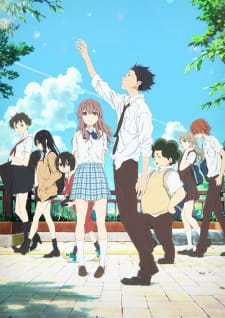
Movie, 2016,
1 ep
Me:-
Author:9
This movie masterfully explores and explains trauma in it's fullest sense - one that is connected to our everyday existence, and from which we cannot escape, avoid or ignore.
Despite it's length, I believe it perfectly shows the fractured psychological conditions of our cast, but instead just by analyzing it as a subject the movie gracefully portrays our mutual needs of human connections, the way they both could harm and elevate us, and our desire to express our feelings, to respect those of others and to simply be understood, despite that along the way we could get hurt and misunderstood.
The guilt is somethings that accompanies our existence, and we would always be prone to feel it. Regretting our actions or behavior - the moments in which we should have been more active, or we shouldn't have, situations like these piles up on our psyche and burden our accurate evaluation of our current circumstances, our current self and self-worth. While we should never ignore the mistakes we've done in our lives it's very substantial to attempt to correct ourselves, if not only for our sake, then for the other people that are significant for us in our life.
Atonement is much more difficult to be achieved than forgiveness, but then again, by taking actions to correct your wrongdoings is more valuable for your own mental stability, as well as it can give you a goal for which you can strive for and eventually emerge from as a better version of yourself, even if you won't be able to notice it on your own.
The brilliance of this movie is that it manages to convey a lot on this topic in a very memorable and impactful way, magnifying it's worth from an entertaining media, to a sincere and heartfelt message that everyone needs to see at least once in their lives.
Despite it's length, I believe it perfectly shows the fractured psychological conditions of our cast, but instead just by analyzing it as a subject the movie gracefully portrays our mutual needs of human connections, the way they both could harm and elevate us, and our desire to express our feelings, to respect those of others and to simply be understood, despite that along the way we could get hurt and misunderstood.
The guilt is somethings that accompanies our existence, and we would always be prone to feel it. Regretting our actions or behavior - the moments in which we should have been more active, or we shouldn't have, situations like these piles up on our psyche and burden our accurate evaluation of our current circumstances, our current self and self-worth. While we should never ignore the mistakes we've done in our lives it's very substantial to attempt to correct ourselves, if not only for our sake, then for the other people that are significant for us in our life.
Atonement is much more difficult to be achieved than forgiveness, but then again, by taking actions to correct your wrongdoings is more valuable for your own mental stability, as well as it can give you a goal for which you can strive for and eventually emerge from as a better version of yourself, even if you won't be able to notice it on your own.
The brilliance of this movie is that it manages to convey a lot on this topic in a very memorable and impactful way, magnifying it's worth from an entertaining media, to a sincere and heartfelt message that everyone needs to see at least once in their lives.
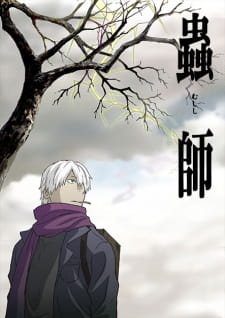
TV, 2005,
26 eps
Me:-
Author:8
Mushishi is therapeutic, even meditative kind of show. It never rushes, it never tries to win your attention with cheap methods, it just tells it's own stories with it's stoic, and steady pace, and it's up to you to watch, think, and reflect upon them.
It's story revolves around a traveling doctor, but it does not delve into the physical and ordinary, instead, it offers you a glimpse of another viewpoint, one in which we, the nature, and all other spirits that are part of both worlds, does co-exist in a steady, unbreakable and constant bond. It's far more often that we do fall ill, get hurt or we do get distressed from our own actions and misconceptions about our lives and our existence as a whole, and this traveling doctor fills the role of a mediator between both worlds, mending both wounds and soothing the minds of those that are enraged, resentful, and that cannot find the mental balance within their lives.
Although he does counsels people on their troubles, subconsciously, he does share his wisdom with you as well. We are just one part of life as a whole, we can never be above the laws of nature, but we should never stumble in our own ignorance as well. This is his mindset about his life, and I do believe this is a notion that is worth exploring at, on a philosophical and psychological level.
It's story revolves around a traveling doctor, but it does not delve into the physical and ordinary, instead, it offers you a glimpse of another viewpoint, one in which we, the nature, and all other spirits that are part of both worlds, does co-exist in a steady, unbreakable and constant bond. It's far more often that we do fall ill, get hurt or we do get distressed from our own actions and misconceptions about our lives and our existence as a whole, and this traveling doctor fills the role of a mediator between both worlds, mending both wounds and soothing the minds of those that are enraged, resentful, and that cannot find the mental balance within their lives.
Although he does counsels people on their troubles, subconsciously, he does share his wisdom with you as well. We are just one part of life as a whole, we can never be above the laws of nature, but we should never stumble in our own ignorance as well. This is his mindset about his life, and I do believe this is a notion that is worth exploring at, on a philosophical and psychological level.
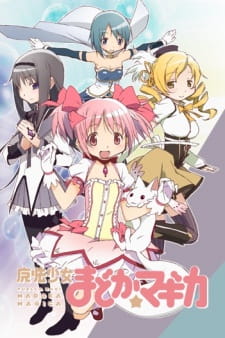
TV, 2011,
12 eps
Me:-
Author:10
This show, is deceptive. Much like Evangelion, it does likes to deceive it's initial viewers about it's setting, and the themes it explores. The stark contrast between the adorable visuals and the unapologetic narrative underlines in even more absolute way the themes of angst, pain and grief that fuel the cast's actions, leading them to this very psychologically intense conclusion.
I do believe the less one knows for the story, the better, but it has to be mentioned that the show does great job of portraying in colourful hues the spectrum of humankind's sorrows and pains, while in the same way it entangle us emotionally within the twisted fairytaile of a story that these girls have to exist in.
The avant-garde and extremely stylized setting, visuals, and designs does hark to the somber, nightmarish and the metaphorically twisted, which gives these series an identity and visual symbolism on which to narratively build upon, and the classical instrumentarium of the sound design works as an emotional leitmotif throughout the show, presenting us in intimate depth the characters struggles, drives and griefs. From artistic standpoint, this show is an absolute marvel, and it does deserve the attention of everyone.
I do believe the less one knows for the story, the better, but it has to be mentioned that the show does great job of portraying in colourful hues the spectrum of humankind's sorrows and pains, while in the same way it entangle us emotionally within the twisted fairytaile of a story that these girls have to exist in.
The avant-garde and extremely stylized setting, visuals, and designs does hark to the somber, nightmarish and the metaphorically twisted, which gives these series an identity and visual symbolism on which to narratively build upon, and the classical instrumentarium of the sound design works as an emotional leitmotif throughout the show, presenting us in intimate depth the characters struggles, drives and griefs. From artistic standpoint, this show is an absolute marvel, and it does deserve the attention of everyone.
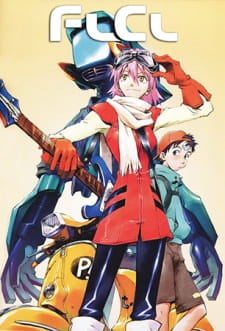
OVA, 2000,
6 eps
Me:-
Author:7
Despite it's short length, this show manages to contain in itself so much raw energy and emotion of any kind. It can be hilariously silly, and in the same way, retrospectively nihilistic, but most importantly, it constantly strives to one-up itself.
Fooly Cooly is a cult classic for alot of reasons, but it should be noted that despite it's overly expressive visuals and oftenly chaotic and insane pace, the show manages to present us a deep psychological picture of most of this story's cast. Their thoughts, dreams, and anxieties about life and the ways they had to deal with them is tangible to everyone, if you do wish to look upon that. The fine addition of the Pillows's OST in these series also enchances the emotional impact that certain moments in it has - "Little Busters" gives us the dopamine shot, it's roaring guitars preparing us for the fluid and amped up action scenes, while "Ride on Shooting Star" has this zany, and mercurial rhythm that makes you wana ride on the Vespa and whack stuff up with your guitar.
The style and aesthetics of this show can definitely can be qualified as a work of art, but not by the classical sense of this statement. The visuals and the delivery is wild, raw, vibrant, in to your face, unapologetic, but certainly demanding of your attention and imagination to fully grasp on.
Fooly Cooly is a cult classic for alot of reasons, but it should be noted that despite it's overly expressive visuals and oftenly chaotic and insane pace, the show manages to present us a deep psychological picture of most of this story's cast. Their thoughts, dreams, and anxieties about life and the ways they had to deal with them is tangible to everyone, if you do wish to look upon that. The fine addition of the Pillows's OST in these series also enchances the emotional impact that certain moments in it has - "Little Busters" gives us the dopamine shot, it's roaring guitars preparing us for the fluid and amped up action scenes, while "Ride on Shooting Star" has this zany, and mercurial rhythm that makes you wana ride on the Vespa and whack stuff up with your guitar.
The style and aesthetics of this show can definitely can be qualified as a work of art, but not by the classical sense of this statement. The visuals and the delivery is wild, raw, vibrant, in to your face, unapologetic, but certainly demanding of your attention and imagination to fully grasp on.

TV, 2004,
24 eps
Me:-
Author:10
This show leans on the immortal classical piece, "The Count of Monte Cristo", but, albeit paying homage to and retelling the story, it presents us with very fresh take on the setting. Despite the original work, having the Count as a main character, and presenting us his righteous and justified revenge, this adaptation does present us with a main character, who is the son of one of the villains in the original piece, which by itself is an interesting twist.
Through Alber's journey, he is methodically being exposed to the worlds of the human vice, the necessities and desires that make us slaves to our lusts, and the myriad of emotions on which we cannot fully control, and which are usually the device that triggers our inevitable downfall. The show is a perfect example of a timeless classic, which interprets the initial plot in a new ways, by still keeping it consistent, yet exploring it even deeper than the original did. The theme of vengeance, even if justified and righteous, and how it can consume one's sanity and soul over the course of time is one of the major aspects of the writing even in the original, but here the characters are portrayed with much more grey, rather than the classic's black and white.
Artistically speaking, this show might have the boldest design in existence, it's patterns and textures implies emotions and feelings, expressed by visual ques, it is something very atypical but yet again, avant-garde in it's approach, unmatched even to this day.
Through Alber's journey, he is methodically being exposed to the worlds of the human vice, the necessities and desires that make us slaves to our lusts, and the myriad of emotions on which we cannot fully control, and which are usually the device that triggers our inevitable downfall. The show is a perfect example of a timeless classic, which interprets the initial plot in a new ways, by still keeping it consistent, yet exploring it even deeper than the original did. The theme of vengeance, even if justified and righteous, and how it can consume one's sanity and soul over the course of time is one of the major aspects of the writing even in the original, but here the characters are portrayed with much more grey, rather than the classic's black and white.
Artistically speaking, this show might have the boldest design in existence, it's patterns and textures implies emotions and feelings, expressed by visual ques, it is something very atypical but yet again, avant-garde in it's approach, unmatched even to this day.
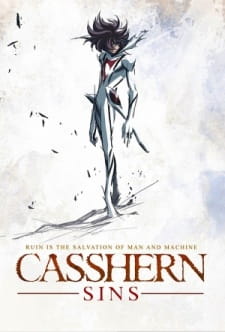
TV, 2008,
24 eps
Me:-
Author:10
This show is itself a journey, both narratively, and in the sense that it does explore alot of stories, mostly connected by attempting to comprehend one's mortality and their self-worth or the way one could define himself within their lifespan.
From human standpoint, if life begins to bloom, it's death is inevitable, and that means to be part of the natural circle. But then again, this concept is foreign to the robots, and this is one of the general themes that the show does like to ponder about. After they inevitably lose their immortality, some of them strive to be perfect, even at the expense of their morality, others do struggle to find their own niche and meaning to their remaining days, and some of them are just seeking the comfort of their companions, while silently waiting for their oblivion.
On the other side we have our main protagonist, who cannot age or be killed, but that fact only further drives his agony and grief, since his conscience never allows him to forget the actions he made and the sins he'll always bear, so in his eyes he's this hopeless drifter, seeking atonement which no one is able to give him, wandering the ruined wastelands in search for salvation that no one could provide.
Despite the fact that most of the characters are mechanical beings, you can't help but see this very vivid and wide spectrum of the human psyche, reflected in their actions and emotions, which in turn does make you reflect on yourself and your personal decisions. I do believe this show might be one of the best existential contemplations in visual form that you can see, for which I encourage everyone to give this show a go, considering the topics are interesting for you.
From human standpoint, if life begins to bloom, it's death is inevitable, and that means to be part of the natural circle. But then again, this concept is foreign to the robots, and this is one of the general themes that the show does like to ponder about. After they inevitably lose their immortality, some of them strive to be perfect, even at the expense of their morality, others do struggle to find their own niche and meaning to their remaining days, and some of them are just seeking the comfort of their companions, while silently waiting for their oblivion.
On the other side we have our main protagonist, who cannot age or be killed, but that fact only further drives his agony and grief, since his conscience never allows him to forget the actions he made and the sins he'll always bear, so in his eyes he's this hopeless drifter, seeking atonement which no one is able to give him, wandering the ruined wastelands in search for salvation that no one could provide.
Despite the fact that most of the characters are mechanical beings, you can't help but see this very vivid and wide spectrum of the human psyche, reflected in their actions and emotions, which in turn does make you reflect on yourself and your personal decisions. I do believe this show might be one of the best existential contemplations in visual form that you can see, for which I encourage everyone to give this show a go, considering the topics are interesting for you.
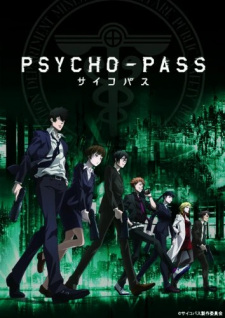
TV, 2012,
22 eps
Me:-
Author:10
Have you ever considered what would the perfect society look like, one that relies heavily on automatisation, and prevents crimes, way before they happen, a highly technological heaven of a sorts?
Well this show present us just that, in it's most gritty and bleak way possible, clearly displaying the faults and downfalls of this system, being perfect on paper, but not accounting the human factor of the equation, which just goes to show how inhumane and opressive it can be.
Psycho-pass is a perfect study of the human condition, one which shows us the importance of the human conscience and it's significance in an age, where everything is presented for greater ease, granted and accessible for everyone, it almost makes so that you don't really need to consider your future, by yourself. You can just go by the current, complying to the system, but the fact itself that this society deems something man-made to be perfect, as this system, is wrong and at a fault. We will always be beings of imperfection, so we could never create something perfect in this way, it will always carry our impurities and flaws within it's design, and we should always aknowledge and note that.
As well as dealing with the psychological, there are alot of sociological and existential aspects that were weaved, showing us the individual and it's place in the society, as well as that the absolute perfection is not existant, but is more of an idealistic concept. Also, a society that tries to rein in every single thought and feeling of it's citizens is opressive in it's roots, and a balance is needed, between the totalitarian strictness and existance, reliant on the individual freedoms, be it in governing or any other aspect of our life.
Well this show present us just that, in it's most gritty and bleak way possible, clearly displaying the faults and downfalls of this system, being perfect on paper, but not accounting the human factor of the equation, which just goes to show how inhumane and opressive it can be.
Psycho-pass is a perfect study of the human condition, one which shows us the importance of the human conscience and it's significance in an age, where everything is presented for greater ease, granted and accessible for everyone, it almost makes so that you don't really need to consider your future, by yourself. You can just go by the current, complying to the system, but the fact itself that this society deems something man-made to be perfect, as this system, is wrong and at a fault. We will always be beings of imperfection, so we could never create something perfect in this way, it will always carry our impurities and flaws within it's design, and we should always aknowledge and note that.
As well as dealing with the psychological, there are alot of sociological and existential aspects that were weaved, showing us the individual and it's place in the society, as well as that the absolute perfection is not existant, but is more of an idealistic concept. Also, a society that tries to rein in every single thought and feeling of it's citizens is opressive in it's roots, and a balance is needed, between the totalitarian strictness and existance, reliant on the individual freedoms, be it in governing or any other aspect of our life.
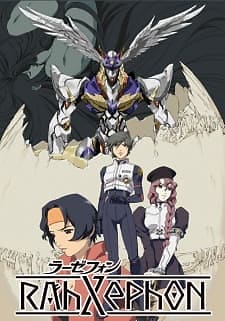
TV, 2002,
26 eps
Me:-
Author:8
RahXephon is an interesting blend of a show - it has the post Evangelion psychological angle, but twisted in it's own, specific way, making itself something close, but then again brand new. At the same time it'll be just unfair to not say a thing about the artistic merit that the show had and was imbued with - the design of the mechanical beings, the outlandish invaders, the beautiful artistic allegories with surreal elements, all this adds up to he evocative visuals.
The themes of self-discovery and learning to appreciate the beauty that surrounds you and is part of your life, despite the circumstances is something that can be difficult to reach, but extremely fulfilling in the long run. In the same way, being able to embrace yourself, for the person you are and for the heritage you hold are again topics that are touched upon and being reflected on by the main character, making it pivotal for his character growth and self-evaluation.
This is a show that could be appreciated for it's many different merits, it's emotionally intense and captivating plot, the interesting dynamic between the main cast, it's complex but yet completely unveiled plot at the show's end, and last but not least, the abstract and hauntingly artistic visual choices, which makes you feel like you're you're watching a living, breathing painting.
The themes of self-discovery and learning to appreciate the beauty that surrounds you and is part of your life, despite the circumstances is something that can be difficult to reach, but extremely fulfilling in the long run. In the same way, being able to embrace yourself, for the person you are and for the heritage you hold are again topics that are touched upon and being reflected on by the main character, making it pivotal for his character growth and self-evaluation.
This is a show that could be appreciated for it's many different merits, it's emotionally intense and captivating plot, the interesting dynamic between the main cast, it's complex but yet completely unveiled plot at the show's end, and last but not least, the abstract and hauntingly artistic visual choices, which makes you feel like you're you're watching a living, breathing painting.

TV, 2002,
13 eps
Me:-
Author:10
Haibane Renmei, is a dream. A dream, literally portraying our internal struggles with our mortality. One that desires to unveil our real selves, beneath the layers of cynicism, lies that we like to believe in, and facts we'd like to deny that exists. This is an unorthodox story, which doesn't shy from what it really is, and silenlty demands for your attention.
The dark, gritty hues, the rough, run-down environments, the piled dust and the aging in any sense atmosphere, strongly contrasts with the Haibane, being joyful and embracing the pastorality, as they quietly exists and are content with the status quo of their lives. The musical scores of the series tenderly guide us to this never changing, rustic fraction of the cast's reality, which calmly lulls the viewer's attention, in the same way providing us quiet and reflective moments to ponder upon.
Are the main cast angels, or are they normal human beings ? The cliché of a concept, which usually deems the angelic being as prim and serene is continuously being eroded, showing us the reasons why they're able to laugh, cry and to have emotional breakdowns. The scene in which their wings does grow out of their bodies underlines the grotesque and primitive nature of life itself - the shedding of skin, the erupted blood, the cries of pain just goes to show the cruelty that exist even in a fictional world, and no one is protected from experiencing it.
The series's abstraction and literal meaning were never completely unveiled, after all these years, which in fact, gives us the opportunity to imagine it on our own. The story itself is quite personal and touching, but at the same time, the setting's ambience gives us this impression that it wear it's veil of mystery and mystique with surprising grace, never preaching us or explaining itself uselessly. This story is a tale of finding yourself, of being unwavering in the face of the truth, no matter how difficult it is to be accepted, and to manage to aknowledge and proceed to live on with both your virtues and vices.
The dark, gritty hues, the rough, run-down environments, the piled dust and the aging in any sense atmosphere, strongly contrasts with the Haibane, being joyful and embracing the pastorality, as they quietly exists and are content with the status quo of their lives. The musical scores of the series tenderly guide us to this never changing, rustic fraction of the cast's reality, which calmly lulls the viewer's attention, in the same way providing us quiet and reflective moments to ponder upon.
Are the main cast angels, or are they normal human beings ? The cliché of a concept, which usually deems the angelic being as prim and serene is continuously being eroded, showing us the reasons why they're able to laugh, cry and to have emotional breakdowns. The scene in which their wings does grow out of their bodies underlines the grotesque and primitive nature of life itself - the shedding of skin, the erupted blood, the cries of pain just goes to show the cruelty that exist even in a fictional world, and no one is protected from experiencing it.
The series's abstraction and literal meaning were never completely unveiled, after all these years, which in fact, gives us the opportunity to imagine it on our own. The story itself is quite personal and touching, but at the same time, the setting's ambience gives us this impression that it wear it's veil of mystery and mystique with surprising grace, never preaching us or explaining itself uselessly. This story is a tale of finding yourself, of being unwavering in the face of the truth, no matter how difficult it is to be accepted, and to manage to aknowledge and proceed to live on with both your virtues and vices.
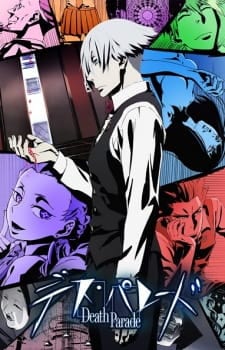
TV, 2015,
12 eps
Me:-
Author:10
In many cultures and religions, there's always been some kind of supernatural entity that was testing the souls of the people that had passed away, are they worthy to ascend, or they shall descend, based on their life choices, and even more so, from their behaviour towards their final judge. In this show, the limbo is presented as a stylish bar, and the judges are sharply dressed bartenders, which does adds certain eccentricity, but it doesn't forget to mix up and distill upon this concept, leaving us with one quite peculiar looking, but full of contrasting flavours drink on it's bar counter.
The setting of this work certainly makes it so that the viewers can see and witness very vividly the essence of the human soul, struggling to grasp their own weakness and insecurities, but in the same way, to reflect upon their dearest feelings and emotions while doing so.
In the way the show's done, often time the viewer can't help but feel as the judge of these stories, it's quite often the motifs behind the departed's actions were justified or overly-emotional, but the stories never felt judgemental or overly leaning towards the one side, which made this show even more appealing of a watch.
This series manages to be both interesting character study, as well as to make you empathetic and reflective upon the fates of others, and on your own existence as well. The sharp and highly contrasting visuals manages to give the whole bar this dreamlike atmosphere, but then again. to be stylish and welcoming , in stark contrast to most of the patrons's stories, fulled with guilt, regret, and contempt for themselves.
The setting of this work certainly makes it so that the viewers can see and witness very vividly the essence of the human soul, struggling to grasp their own weakness and insecurities, but in the same way, to reflect upon their dearest feelings and emotions while doing so.
In the way the show's done, often time the viewer can't help but feel as the judge of these stories, it's quite often the motifs behind the departed's actions were justified or overly-emotional, but the stories never felt judgemental or overly leaning towards the one side, which made this show even more appealing of a watch.
This series manages to be both interesting character study, as well as to make you empathetic and reflective upon the fates of others, and on your own existence as well. The sharp and highly contrasting visuals manages to give the whole bar this dreamlike atmosphere, but then again. to be stylish and welcoming , in stark contrast to most of the patrons's stories, fulled with guilt, regret, and contempt for themselves.
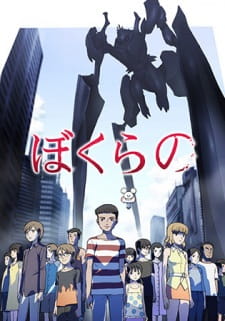
TV, 2007,
24 eps
Me:-
Author:-
This is a story about self-reflection, and the value of the human life. The show's plot itself is the engine of the characters' existential torture, in which many succumb to their darkest thoughts and desires, but some manages to elevate themselves, displaying their bravery and virtuousness by simple altruism in their final hours.
There is certainly a mystery element as well, which slowly but steadily unveils the meaning behind this battle for survival, and hardens our cast's resolve, or make them fall apart mentally. The opening song from these series, Chiaki Ishikawa's Uninstall, manages to perfectly portray the existential struggle of the main cast, the fact that we, as well as all of mankind, are just "one of the countless specks of dust on this planet", who cannot even "choose the season of their passing", and all we can do about this is to just "pretend that we are warriors who knows no fear", and to stoically embrace their fate.
The show does perfect portrayal of the various ways that the human mind can rationalize and come in terms with their own mortality, or the exact opposite, the ways in which the characters lose total grip of their sanity and morality, and in their blind thirst for vengeance, to prove their worth, no matter the cost and the prices of human lives that has to be paid for this.
There is certainly a mystery element as well, which slowly but steadily unveils the meaning behind this battle for survival, and hardens our cast's resolve, or make them fall apart mentally. The opening song from these series, Chiaki Ishikawa's Uninstall, manages to perfectly portray the existential struggle of the main cast, the fact that we, as well as all of mankind, are just "one of the countless specks of dust on this planet", who cannot even "choose the season of their passing", and all we can do about this is to just "pretend that we are warriors who knows no fear", and to stoically embrace their fate.
The show does perfect portrayal of the various ways that the human mind can rationalize and come in terms with their own mortality, or the exact opposite, the ways in which the characters lose total grip of their sanity and morality, and in their blind thirst for vengeance, to prove their worth, no matter the cost and the prices of human lives that has to be paid for this.
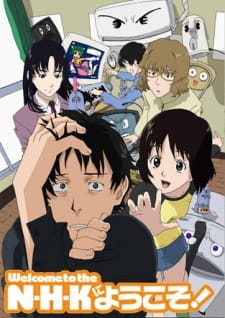
TV, 2006,
24 eps
Me:-
Author:9
The exploration of the human psyche often revolve around the themes of existing as a separate being, of one's self worth, and the values that the others see in you. This show offers one personal story of a person, trying to cope with the depressing and nihilistic reality that our world offers, while being lost in the lack of self-worth he sees within himself.
The setting is realistic, and our main character's self-exploration can feel relatable and traumatizing, painstakingly reminding us of ourselves, our struggles in our everyday life, and the general feeling of insignificance and hollowness we did hold within ourselves, things that we're often too stressed to stare back at and share with others.
The show feels both patronizing and scornful towards it's cast, an in a way feels as a honest critique of the of the otaku culture, and how it is often used as a way of escapism from the reality of one's life. In the same way, it does show that you can attempt to break through this prison of a mental state, by forming bonds with others, and expressing your feelings to them, no matter how difficult and vulnerable that can make you feel.
While the topics of this work are serious and definitely worth reflecting upon, the show never feels monotonous and doesn't stray from being funny and humorous about itself, even though it generally revolves around the mental instability in all of the cast. This is a story that is being very honest, raw and unapologetic about itself, and you can't help but feel attached to this bittersweet satire about the ups and more oftenly, downs of the human psyche.
The setting is realistic, and our main character's self-exploration can feel relatable and traumatizing, painstakingly reminding us of ourselves, our struggles in our everyday life, and the general feeling of insignificance and hollowness we did hold within ourselves, things that we're often too stressed to stare back at and share with others.
The show feels both patronizing and scornful towards it's cast, an in a way feels as a honest critique of the of the otaku culture, and how it is often used as a way of escapism from the reality of one's life. In the same way, it does show that you can attempt to break through this prison of a mental state, by forming bonds with others, and expressing your feelings to them, no matter how difficult and vulnerable that can make you feel.
While the topics of this work are serious and definitely worth reflecting upon, the show never feels monotonous and doesn't stray from being funny and humorous about itself, even though it generally revolves around the mental instability in all of the cast. This is a story that is being very honest, raw and unapologetic about itself, and you can't help but feel attached to this bittersweet satire about the ups and more oftenly, downs of the human psyche.

Movie, 2000,
1 ep
Me:-
Author:8
In this dark fiction of a setting, we can see the consequences of an oppressive regime, gaining authority over the country with ruthless laws, enforced by the police and the secret police corps. In the center of this movie we can see the relationship between one of these special corps officers and a girl, branded as terrorist from the current regime.
While she is prosecuted and considered criminal, she has the freedom of mind to believe in what she feels is right, while he, being technically free, can't shake the feeling of being burdened and chained, filled with regret and seeing himself unable to move on from his own mental state. There's alot more that can be seen and analyzed from the allegories of the Red riding hood and the Wolf, and the story does explore it's themes with somber, very realistic art style, and minimalistic, often delibearately absent OST, giving room for the watcher's thoughts and emotions to course through them, without any external filters.
As a standalone movie, it does great to portray both very artistically and grotesquely violent the actions that these people had to take, the resentment they had towards themselves for doing so, and for their guilt, corroding their souls.
While she is prosecuted and considered criminal, she has the freedom of mind to believe in what she feels is right, while he, being technically free, can't shake the feeling of being burdened and chained, filled with regret and seeing himself unable to move on from his own mental state. There's alot more that can be seen and analyzed from the allegories of the Red riding hood and the Wolf, and the story does explore it's themes with somber, very realistic art style, and minimalistic, often delibearately absent OST, giving room for the watcher's thoughts and emotions to course through them, without any external filters.
As a standalone movie, it does great to portray both very artistically and grotesquely violent the actions that these people had to take, the resentment they had towards themselves for doing so, and for their guilt, corroding their souls.

TV, 2003,
13 eps
Me:-
Author:9
This anime presents us with a journey, both happening within the show's world, and internally, inside the main protagonist's mind. The journey that Kino takes let us see particular fragmented parts of the humankind's social customs and understandings, as well abstracts ideas like, the human utopia, and how fragile, frail and different concept this is, as well as how every person has different but right in their own ways, views about life.
While traveling with Kino, you can't help but feel you are alongside her, observing along her strides as a foreigner, in a world that is somewhat close, yet the longer you watch, the more alienated you feel from it. The quiet morning when she trots with Hermes on the unknown, dusty roads and the late night banters around the campfires does makes you feel like you're on adventure yourself.
The show present us the humankind with different colours and tones, each reflecting a certain part of our existence, and it's up to us to decide if the moral compass of the said character's right or wrong, their actions are all just a pile or decisions and consequences, based off their culture and understandings. Same can be said about Kino, the lonely traveler, always on the move, ready to meet up and see the worst and the best in everyone that she met, but always having the will to move forward and greet the next dawn.
While traveling with Kino, you can't help but feel you are alongside her, observing along her strides as a foreigner, in a world that is somewhat close, yet the longer you watch, the more alienated you feel from it. The quiet morning when she trots with Hermes on the unknown, dusty roads and the late night banters around the campfires does makes you feel like you're on adventure yourself.
The show present us the humankind with different colours and tones, each reflecting a certain part of our existence, and it's up to us to decide if the moral compass of the said character's right or wrong, their actions are all just a pile or decisions and consequences, based off their culture and understandings. Same can be said about Kino, the lonely traveler, always on the move, ready to meet up and see the worst and the best in everyone that she met, but always having the will to move forward and greet the next dawn.
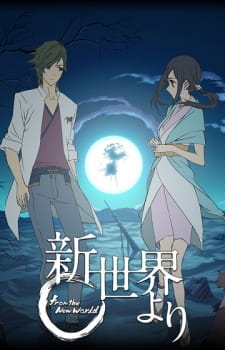
TV, 2012,
25 eps
Me:-
Author:7
The world, presented in this show is an outlandish one, on first glance. The story and setting are simple at the start, focusing on our main cast of characters, until it starts to slowly unveil it's mist of deceptions, lies and unscrupulous and inhumane laws that the citizens has to abide to in order to survive.
The themes that this show presents stems from the human psychology and the way it affects the individual development of our minds, to the understanding of our role and task in the society, and our need to desire to be part of it.
Some of the cast conforms to this world's rules, others decide to abandon them and be on their own, and others do try to understand them, as to why they exist and why does the secrets kept from them had to define the current world they live in.
The dystopian society in this world, built with foundations and hopes that the ends justify the means, is an interesting topic for us to reflect on, showing us how any of the changes in the presented world has it's reasons and means, and why they exist in the form they currently do.
The themes that this show presents stems from the human psychology and the way it affects the individual development of our minds, to the understanding of our role and task in the society, and our need to desire to be part of it.
Some of the cast conforms to this world's rules, others decide to abandon them and be on their own, and others do try to understand them, as to why they exist and why does the secrets kept from them had to define the current world they live in.
The dystopian society in this world, built with foundations and hopes that the ends justify the means, is an interesting topic for us to reflect on, showing us how any of the changes in the presented world has it's reasons and means, and why they exist in the form they currently do.

ONA, 2008,
6 eps
Me:-
Author:7
Time of Eve, is a story about freedom, and prejudices. It shows us one possible future, in which the AI and the robotics are that widespread and well-developed, that even the average households do have their own androids. But, despite the docile and cold existence, based on solid logic alone, the androids do have much more to show and express, at the right place in the right time.
These inclusion of feelings and emotions in the androids, initially is difficult to be accepted as a norm, but, besides this, nothing really differentiates them too much from the humankind, and there's where the psychological aspect of the show becomes evident - in a neutral place, in which none of the sides is superior, can one express and find acceptance of themselves, be they humans or androids. And this brings us to the rhetorical question, does being different means that you can't find a middle ground to talk, understand and coexist with the others, despite their origins, or all it matters is the mutual understanding and empathy towards the others, no matter who they are?
This very short show does manage to make us think about the invisible boundaries we do like to set around ourselves, that we neatly call "The norm", but in the same way these before set walls might someday deny us the chance of seeing the obvious, and the natural, so in a way, this piece challenges us to look outside the box.
These inclusion of feelings and emotions in the androids, initially is difficult to be accepted as a norm, but, besides this, nothing really differentiates them too much from the humankind, and there's where the psychological aspect of the show becomes evident - in a neutral place, in which none of the sides is superior, can one express and find acceptance of themselves, be they humans or androids. And this brings us to the rhetorical question, does being different means that you can't find a middle ground to talk, understand and coexist with the others, despite their origins, or all it matters is the mutual understanding and empathy towards the others, no matter who they are?
This very short show does manage to make us think about the invisible boundaries we do like to set around ourselves, that we neatly call "The norm", but in the same way these before set walls might someday deny us the chance of seeing the obvious, and the natural, so in a way, this piece challenges us to look outside the box.
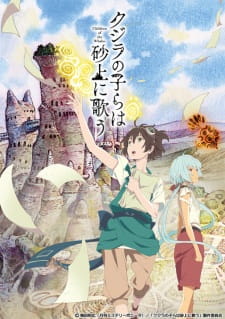
TV, 2017,
12 eps
Me:-
Author:9
Children of the Whales, is a series about emotions. Emotions and how they conflicts within ourselves, emotions as a vehicle of one's existence, and emotions and the times we repress them, even though this comes at a price, later on.
We're presented with a story, about people that live on a remote floating island, having humble but idyllic lives, albeit being isolated from the world they reside in. Once that veil of blissful ignorance is broken and another country attempts to invade their peaceful island, they need to either quietly perish, or attempt to struggle and fight on to the bitter end.
The presented mystery of the writing is masterfully blended with the captivating world building that this show presents to us. Within the rustic and detailed background art, you can see a story about vastly different cultures, with polar opposite worldviews, and lifestyles, struggling for the chance to exist in this world. And while the pacifistic nation, while trying to restrain the influence of the negative emotions, is bursting with hopes, griefs and sorrows, while the invading nation is one that has deliberately had stripped it's inhabitants of their feelings, leaving them as cold, logical and merciless husks of people.
For it's short episode count, the series manages to expand upon the psychological circumstances of it's cast, and to give us a lot of concepts on which we can ponder upon. In the beginning, the feel of utopia that exudes from the pastoral lifestyle of the inhabitants of the island is mercilessly shattered, showing us the fractured and tragic individual stories of the cast, and how these apocalyptic incidents inspires them to act - to either move forward and look towards the new dawn, or to stare down in the abyss of their own depression, dragging as much people as they can in it.
We're presented with a story, about people that live on a remote floating island, having humble but idyllic lives, albeit being isolated from the world they reside in. Once that veil of blissful ignorance is broken and another country attempts to invade their peaceful island, they need to either quietly perish, or attempt to struggle and fight on to the bitter end.
The presented mystery of the writing is masterfully blended with the captivating world building that this show presents to us. Within the rustic and detailed background art, you can see a story about vastly different cultures, with polar opposite worldviews, and lifestyles, struggling for the chance to exist in this world. And while the pacifistic nation, while trying to restrain the influence of the negative emotions, is bursting with hopes, griefs and sorrows, while the invading nation is one that has deliberately had stripped it's inhabitants of their feelings, leaving them as cold, logical and merciless husks of people.
For it's short episode count, the series manages to expand upon the psychological circumstances of it's cast, and to give us a lot of concepts on which we can ponder upon. In the beginning, the feel of utopia that exudes from the pastoral lifestyle of the inhabitants of the island is mercilessly shattered, showing us the fractured and tragic individual stories of the cast, and how these apocalyptic incidents inspires them to act - to either move forward and look towards the new dawn, or to stare down in the abyss of their own depression, dragging as much people as they can in it.

TV, 2003,
26 eps
Me:-
Author:9
Wolf's rain is an interesting mixture of dystopian sci-fi, mixed with high-fantasy folk tales, and the mixture does not only covers the visual cues. As any good dystopian sci-fi, it tackles the themes of existentialism, and our place in the world, amongst the constant and never changing progress of the humanity. At the same time, as a complete juxtaposition we have the fantastical tale of the journey that the wolves take, while clinging to their own ancestral knowledge, and trying to attain "Paradise", which in itself is an absolute contrast to the bleak nihilism that the current world is presented as.
The inclusion of wolves is by no means pure coincidence, their presence is highly symbolical and reflects how they were one of the dozen other species that went extinct over Japan due to the rampant urbanization and industrialization of the country, even though they were considered sacred in the Shinto folklore. A historical example such as this just goes to show how we as a species are willing to bend, control and twist all of the nature's laws just so we can achieve our goals, which is a metaphore for our spiritual decline and our absolute acceptance of the technological advancement, no matter the consequences.
The struggle between these two aspects is the thing that drives the philosophical questions in this work, is the constant work for improvement good enough reason to cut down all our roots with our more natural side? Does the ends really justify the means, and how should one strive to exist as, within a constant struggle with the world, or in a constant search for harmony, and internal peace within yourself and your surroundings ?
The inclusion of wolves is by no means pure coincidence, their presence is highly symbolical and reflects how they were one of the dozen other species that went extinct over Japan due to the rampant urbanization and industrialization of the country, even though they were considered sacred in the Shinto folklore. A historical example such as this just goes to show how we as a species are willing to bend, control and twist all of the nature's laws just so we can achieve our goals, which is a metaphore for our spiritual decline and our absolute acceptance of the technological advancement, no matter the consequences.
The struggle between these two aspects is the thing that drives the philosophical questions in this work, is the constant work for improvement good enough reason to cut down all our roots with our more natural side? Does the ends really justify the means, and how should one strive to exist as, within a constant struggle with the world, or in a constant search for harmony, and internal peace within yourself and your surroundings ?
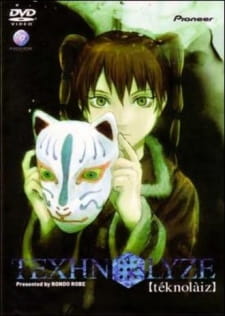
TV, 2003,
22 eps
Me:-
Author:6
Texholyze is a long, drawn out and full of sorrow thesis of the human condition. It's a work, seeped in nihilism and hopelessness, a story about humanity, in which almost nothing feels human, but cold, heartless and detached. It's story revolves around one desolate, almost ruined down, living off street warfare and illegal lab experiments, and it features the unfolding fates of numerous people in it. The city's portrayal is gritty, and monochrome, and in it emotionless and ruthless people, trying to survive by doing whatever it takes, take shelter.
By being presented by this picture, one has to ponder, why has the world been filled with so much disinterest and coldness ? Why does everyone can't see the little glitters of hope, and tries to trample over the others, securing himself yet another day of living, and is this living at all, or just straight up, animalistic survival of the fittest ?
By being presented by this picture, one has to ponder, why has the world been filled with so much disinterest and coldness ? Why does everyone can't see the little glitters of hope, and tries to trample over the others, securing himself yet another day of living, and is this living at all, or just straight up, animalistic survival of the fittest ?
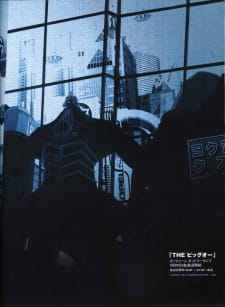
TV, 1999,
26 eps
Me:-
Author:7
The Big O is a mystery and a psychological journey, hid under the disguise of a super robot show. It's artistic choice does harks back to the roots of its western influence, while it's narrative setting are being another beast of itself.
It's introduction is enough to present the viewers with this specific mood, the veiled, filled with mist streets of the city, the bleak and devoid of life colours, the contemplations of the main characters about the lack of development in them, as human beings and the city, existing like concrete prison around them.
The show does presents itself as a mystery, and it doesn't really want to share them to the end itself, while in the same way it does present us with the character's viewpoints on their existence - the manufactured being, the charismatic negotiator, the police officer, not being able to embrace his true feelings, the journalist, and his machiavelian crusade against this world's farce and it's heartless inhabitants - all of these viewpoints does makes sense and in a way, have a fair assessment for the world they exist in.
Again, this is show close to Eva for the simple fact that it pretends to be a super robot show, while playing it's own cards to weave out complex web of influences, or vistas seeped with symbolism, which makes you question what is real and what's not in this place, who is sincere and who is not, and is this whole story true, or it's in actuality a well fabricated stage ?
It's introduction is enough to present the viewers with this specific mood, the veiled, filled with mist streets of the city, the bleak and devoid of life colours, the contemplations of the main characters about the lack of development in them, as human beings and the city, existing like concrete prison around them.
The show does presents itself as a mystery, and it doesn't really want to share them to the end itself, while in the same way it does present us with the character's viewpoints on their existence - the manufactured being, the charismatic negotiator, the police officer, not being able to embrace his true feelings, the journalist, and his machiavelian crusade against this world's farce and it's heartless inhabitants - all of these viewpoints does makes sense and in a way, have a fair assessment for the world they exist in.
Again, this is show close to Eva for the simple fact that it pretends to be a super robot show, while playing it's own cards to weave out complex web of influences, or vistas seeped with symbolism, which makes you question what is real and what's not in this place, who is sincere and who is not, and is this whole story true, or it's in actuality a well fabricated stage ?
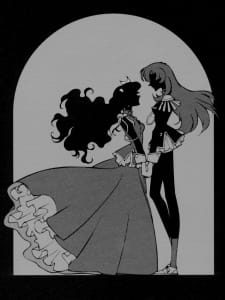
TV, 1997,
39 eps
Me:-
Author:8
Utena is a show that might stay on the pinnacle of shoujo media for myriad of reasons, the story presented to the viewer is very unique take of the fairytale fantasy tropes, clashing with the contemporary nihilism of the setting. The bold symbolism that the whole show is full of might feel like an overkill for some, and I do understand that, but in the same time thinking, reflecting and tracing back the allegories to the subtle character interactions does make the viewing pretty interesting.
The show does like to state and deliver upon the viewer varied, and often hard to swallow themes, things that make us uncomfortable or we don't like to admit, but then again that show is special, for the fact that it is not afraid to explore the said topics down to their roots, and often juxtaposing the primal instincts that humankind has, with the radiant idealism that we could be driven by.
The character cast is one of the highlights of the show's writing, as well. They all are well defined, and while they're portrayed as these elegant and gracious people, the major drive in the show is to explore their twisted and traumatized side. They all bear grief, regrets and have goals and dreams to strive for, which are the parts when their personality shines and glitters, presenting us their determination and dedication towards the goals goals in their hearts and souls.
In the same way, the "Revolutionary" part of the show is well deserved, for the simple fact that it treads with themes that are hard to tackle, and in the same way it manages to be this character study of a show, exploring their morality, as well as their identity and how do they feel that they fit in the society as a whole. As well as that, the series doesn't stray away from exploring the sexual identity of it's cast, by this way adding even more layers to the complex enough characters.
In a way, this show might be one of the most artistically-rich media you can find, walking the thin line between avant-garde and entirely experimental, challenging your worldviews and your perceptions, and last, but not least, presenting you how the pretty fairytales can look vivid and joyful on the inside, while hiding their dark undertones and twisted metaphors in them, just waiting to be explored.
The show does like to state and deliver upon the viewer varied, and often hard to swallow themes, things that make us uncomfortable or we don't like to admit, but then again that show is special, for the fact that it is not afraid to explore the said topics down to their roots, and often juxtaposing the primal instincts that humankind has, with the radiant idealism that we could be driven by.
The character cast is one of the highlights of the show's writing, as well. They all are well defined, and while they're portrayed as these elegant and gracious people, the major drive in the show is to explore their twisted and traumatized side. They all bear grief, regrets and have goals and dreams to strive for, which are the parts when their personality shines and glitters, presenting us their determination and dedication towards the goals goals in their hearts and souls.
In the same way, the "Revolutionary" part of the show is well deserved, for the simple fact that it treads with themes that are hard to tackle, and in the same way it manages to be this character study of a show, exploring their morality, as well as their identity and how do they feel that they fit in the society as a whole. As well as that, the series doesn't stray away from exploring the sexual identity of it's cast, by this way adding even more layers to the complex enough characters.
In a way, this show might be one of the most artistically-rich media you can find, walking the thin line between avant-garde and entirely experimental, challenging your worldviews and your perceptions, and last, but not least, presenting you how the pretty fairytales can look vivid and joyful on the inside, while hiding their dark undertones and twisted metaphors in them, just waiting to be explored.
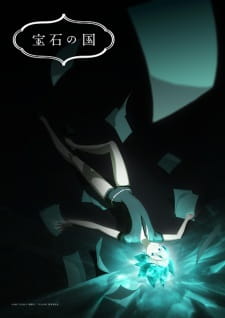
TV, 2017,
12 eps
Me:-
Author:7
Land of the Lustrous is an interesting case of a show. It's premise is simple, if it's considered as a mere episodic watch, but the setting and our main character's thoughts and realizations about the worlds that surrounds them and why is it in it's current state can be something very thought provoking.
Throughout the show's duration, we follow them on as they try to find use for themself beneath the other gems, and by trial and error they quickly realize they cannot be like the others, and just fit the mold, pretending to be like them. This narrative works well with the worldbuilding, but at the same time, it presents us the way we all strive to find our place in this world, although by different ways than Phos's, so we can say their whole personal growth can be relatable to everyone, as long as you manage to percieve it.
Another interesting allegory is the inhabitants of this world, which were presented to be decendants of the human race, and can also be considered as a visualization of the human strife within himself. The gems, are the "bones" of the humankind, strong, resilient, and unflinching in the face of their duty, the "flesh" are the water beings, that have devolved into non-confrontational beings, who only seeks their own comfort, above everything else, and the "soul" is presented by the race of the spectral beings, being in their war-crazed state, seeking to conquer and destroy every other living being, for the sake of destruction. Combining these three states of the humanity, we can see the full picture, and states the simple fact that, we as beings, are unstable, always in a state of internal conflicts within ourselves, conflicts we can never absolutely conclude.
On prima vista the show might not seem like it, but with it's subtlety, it manages to convey it's deep psychological meaning and present us the human condition from an interesting viewpoint, for those who are willing to look beyond the surface.
Throughout the show's duration, we follow them on as they try to find use for themself beneath the other gems, and by trial and error they quickly realize they cannot be like the others, and just fit the mold, pretending to be like them. This narrative works well with the worldbuilding, but at the same time, it presents us the way we all strive to find our place in this world, although by different ways than Phos's, so we can say their whole personal growth can be relatable to everyone, as long as you manage to percieve it.
Another interesting allegory is the inhabitants of this world, which were presented to be decendants of the human race, and can also be considered as a visualization of the human strife within himself. The gems, are the "bones" of the humankind, strong, resilient, and unflinching in the face of their duty, the "flesh" are the water beings, that have devolved into non-confrontational beings, who only seeks their own comfort, above everything else, and the "soul" is presented by the race of the spectral beings, being in their war-crazed state, seeking to conquer and destroy every other living being, for the sake of destruction. Combining these three states of the humanity, we can see the full picture, and states the simple fact that, we as beings, are unstable, always in a state of internal conflicts within ourselves, conflicts we can never absolutely conclude.
On prima vista the show might not seem like it, but with it's subtlety, it manages to convey it's deep psychological meaning and present us the human condition from an interesting viewpoint, for those who are willing to look beyond the surface.
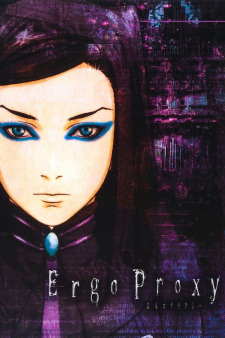
TV, 2006,
23 eps
Me:-
Author:-
Ergo Proxy is a show which is deeply rooted into the human psyche and it's needs and desires. It's slow but determined runtime presents us the struggle of the humankind, in a bleak, dystopian setting. The dark and brooding feel that this show's aesthetics provides is something that can definitely seep into one's own mind.
The show presents us that the primal desires of any single creature are not too different from one another, the desire to live and to be as free as possible. It also shows us how delusional we can be for these simple desires, if the monotonous everyday grinds any remaining gears of conscience within us, leaving us to be a husks of a human beings.
Artistically and philosophical, this show is a real treat for any person who does desire to experience a deep, thought-provoking story but doesn't mind the slower and steady pace.
The show presents us that the primal desires of any single creature are not too different from one another, the desire to live and to be as free as possible. It also shows us how delusional we can be for these simple desires, if the monotonous everyday grinds any remaining gears of conscience within us, leaving us to be a husks of a human beings.
Artistically and philosophical, this show is a real treat for any person who does desire to experience a deep, thought-provoking story but doesn't mind the slower and steady pace.
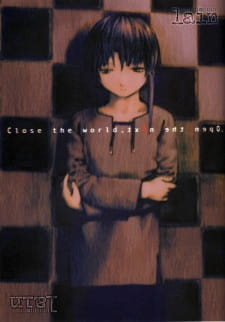
TV, 1998,
13 eps
Me:-
Author:7
A famous cult classic of a show, Lain is a show about alot of things, and none in too particular. A show about how the humankind slowly lose themselves the feeling of being human, and a single, independent unit, and in turn, desires to attain the more ultimate from of freedom, one in which the constraints of the physical are being surpassed. Can everyone control their newly attained freedoms, or they inevitably turn into their downfall ? Do you really lose yourself within the Wired, or you just find another part of yourself ? Is there something as an absolute freedom, or that's just another word to name the anarchy ? Does the Wired helps the people, by uniting them and giving them a mutual platform in which they can discuss all they will, or the said people are just being enthralled by the fact that they can do all they can wish, in this protected and safe environment ?
These and a lot more other questions are being asked or discussed about in the show, but none of them are left with conclusive answer. The show itself is an enigma, showing us one very timid and shy girl, which got engaged into the Wired, and by this way she found another part of herself, and it's up to us to decide if that's a good thing or not.
Despite the fact that these series are depicted as sci-fi, I do believe the problems that this show is speaking about are apparent in our current society and even on an individual, personal level. The influence on the Internet on our society is so grand and massive that we'll never be able to fully assimilate and document it's impact in detail, but one thing is for sure, it is something that can alienate people from one another, but in the same time, it can be something that can unite them as well, it's all depending on it's use.
The show's aesthetic and audio editing are something extremely memorable, even if the animation itself could look dated for some. The world, being almost monochrome, the silent moments, in which only the static of the coursing electricity can be heard. This tale is one of solitude, coldness and the lingering emotions of some, within the cold world of rationality, a tale that makes you contemplative and pensive. This is a show that is very rich on themes and concepts that it incorporates, that one can mull over in their minds for years to come.
These and a lot more other questions are being asked or discussed about in the show, but none of them are left with conclusive answer. The show itself is an enigma, showing us one very timid and shy girl, which got engaged into the Wired, and by this way she found another part of herself, and it's up to us to decide if that's a good thing or not.
Despite the fact that these series are depicted as sci-fi, I do believe the problems that this show is speaking about are apparent in our current society and even on an individual, personal level. The influence on the Internet on our society is so grand and massive that we'll never be able to fully assimilate and document it's impact in detail, but one thing is for sure, it is something that can alienate people from one another, but in the same time, it can be something that can unite them as well, it's all depending on it's use.
The show's aesthetic and audio editing are something extremely memorable, even if the animation itself could look dated for some. The world, being almost monochrome, the silent moments, in which only the static of the coursing electricity can be heard. This tale is one of solitude, coldness and the lingering emotions of some, within the cold world of rationality, a tale that makes you contemplative and pensive. This is a show that is very rich on themes and concepts that it incorporates, that one can mull over in their minds for years to come.
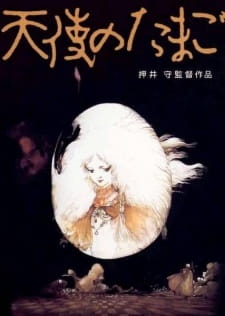
OVA, 1985,
1 ep
Me:-
Author:8
While the other works in this list are avant-garde and in some way, bound by philosophy and the state of the human condition, maybe one of the most risque, subtle and straight up haunting of them all is Angel's Egg. It's a story that it's author himself, feels as if it has no real meaning and it's up to everyone to think of one for themselves.
The story of the tale revolves around few characters, with vague to none context why are they in this eerie, and desolate place, what is the meaning of the dystopian-horror backdrop that the whole world is hued in, and what is the purpose of this existence in the first place.
This work focuses much more of using it's beautiful and unsettling grace to lure it's watchers into a forlorn nightmare, which doesn't really evokes fear in it's primal self, but rather, a shivering feel of solitude and helplessness, of a world with no meaning, sense or purpose, a twisted fracture of the world as we'd know it.
The visual fidelity and the harrowing scores can still feel impactful, despite it's age, and may to this day, be one of the most abstract and masterfully crafted passion projects in the anime medium.
The story of the tale revolves around few characters, with vague to none context why are they in this eerie, and desolate place, what is the meaning of the dystopian-horror backdrop that the whole world is hued in, and what is the purpose of this existence in the first place.
This work focuses much more of using it's beautiful and unsettling grace to lure it's watchers into a forlorn nightmare, which doesn't really evokes fear in it's primal self, but rather, a shivering feel of solitude and helplessness, of a world with no meaning, sense or purpose, a twisted fracture of the world as we'd know it.
The visual fidelity and the harrowing scores can still feel impactful, despite it's age, and may to this day, be one of the most abstract and masterfully crafted passion projects in the anime medium.
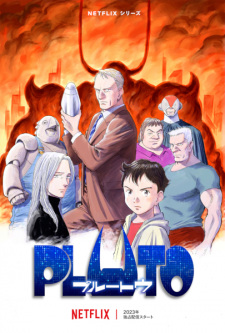
ONA, 2023,
8 eps
Me:-
Author:9
Throughout mankind's existence, the themes concerning our creation - why we exist, how we came to be the species we are now and what is our future had fascinated our minds way before we stared to write down our history. Yet another topic, similar to the before mentioned, is equally if not more important for us as species - can we create beings like us in artificial way, and should we even try to do that, given the fact that in every culture on earth our bodies, minds and hearts are sacred and one of a kind.
Amidst these grand, and morally ambiguous contemplations, rightfully stays "Pluto" - a specific blend of artistic visions, combining the the character profiles and setting of Osamu Tezuka's "Astro Boy" with the gritty and existentially poignant interpretation of the said setting by Naoki Urasawa, completed with his own character redesign and further exploration of their personalities.
The world depicted in this work is complex - in very atypical fashion from that kind of work, the rift between the humankind and artificial intelligence is visible, and yet narrowed down, but the special in that depicted case is, that both sides had reached to mutual acceptance and agreement. The android citizens of this new world all have their rights and place in the society which sounds like an utopia at first, until the show has finally start to unveil it's real colors.
The fickle peace that exists is one that is laid upon so much death and sacrifice from the many wars that this world had to endure, and eventually, to finally attain it with the help of the few exceptional androids, presenting the pinnacle of human virtue within their personalities.
The story of this work is one that presents the multifaceted nature of this world, depicted as utopian and yet dystopian, expressing the virtues and weaknesses of it's characters and presenting us one poignant insight into their mindsets - one full of human emotions that are cold and detached, and robotic ones that are full with life and empathy.
Amidst these grand, and morally ambiguous contemplations, rightfully stays "Pluto" - a specific blend of artistic visions, combining the the character profiles and setting of Osamu Tezuka's "Astro Boy" with the gritty and existentially poignant interpretation of the said setting by Naoki Urasawa, completed with his own character redesign and further exploration of their personalities.
The world depicted in this work is complex - in very atypical fashion from that kind of work, the rift between the humankind and artificial intelligence is visible, and yet narrowed down, but the special in that depicted case is, that both sides had reached to mutual acceptance and agreement. The android citizens of this new world all have their rights and place in the society which sounds like an utopia at first, until the show has finally start to unveil it's real colors.
The fickle peace that exists is one that is laid upon so much death and sacrifice from the many wars that this world had to endure, and eventually, to finally attain it with the help of the few exceptional androids, presenting the pinnacle of human virtue within their personalities.
The story of this work is one that presents the multifaceted nature of this world, depicted as utopian and yet dystopian, expressing the virtues and weaknesses of it's characters and presenting us one poignant insight into their mindsets - one full of human emotions that are cold and detached, and robotic ones that are full with life and empathy.


